Don’t let your company get caught off guard by CVSA Brake Safety Week, August 25th to August 31st, 2024!
Shippers and carriers, mark your calendars! Brake Safety Week is soon approaching. This annual event aims to improve commercial vehicle safety and make our roadways safer, however it does impact those in logistics! Shippers and carriers alike can see disruption to their businesses. To keep your operations moving forward, it’s helpful to understand what Brake Safety Week entails and its effect on the overall freight market.
What is the CVSA? What is Brake Safety Week?
The Commercial Vehicle Safety Alliance (CVSA) is a non-profit organization dedicated to improving commercial motor vehicle safety through collaboration between law enforcement, industry stakeholders, and the public sector. In partnership with the Federal Motor Carrier Safety Administration (FMCSA), the CVSA launched its Operation Airbrake program in 1998. The goal of this initiative is to improve commercial vehicle brake safety and highway crashes due to faulty brake systems.
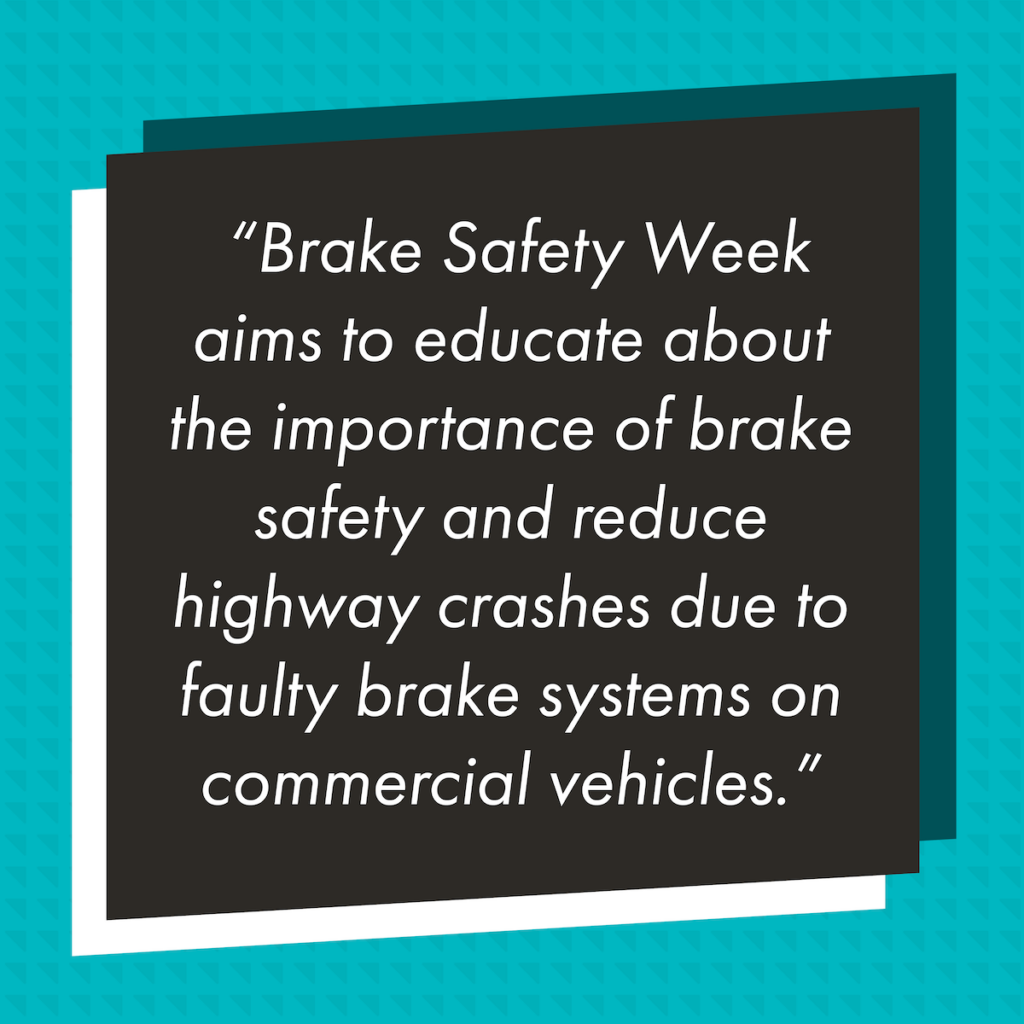
This initiative includes two annual events, Brake Safety Week and an unannounced one-day inspection event, that can happen at any time. During both events, commercial vehicle inspectors conduct brake safety inspections on large trucks and buses. The inspections take place across North America, so the U.S., Canada, and Mexico.
Brake safety is an important focus because brake-related concerns or issues are the largest percentage of out-of-service violations during roadside inspections. In fact, brake safety violations were the top vehicle violation at 25.2 percent of all out-of-service violations during last year’s International Roadcheck Event.
Each year has a primary focus surrounding brake safety, with this year’s being the condition of brake lining and pads. During roadside inspections, any commercial vehicles found to have brake-related out-of-service violations will be removed from the roadways until they can be corrected.
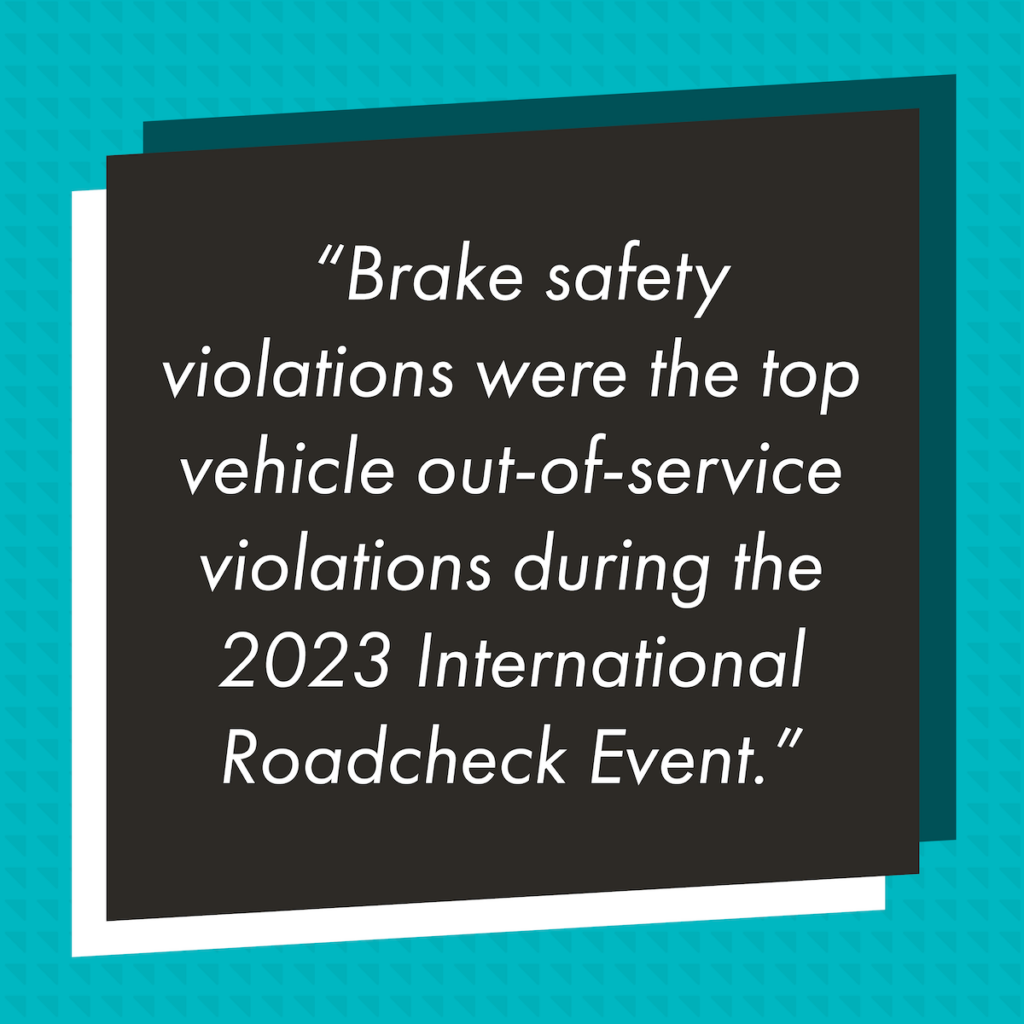
Brake Safety Week Inspection Procedure
These are the items the CVSA inspector will look over during your inspection:
- Driver’s license
- Registration
- Low air warning device
- Pushrod travel
- Brake linings/drums
- Air loss rate
- Tractor protection system
A typical inspection during Brake Safety Week will follow these steps:
- Check air brake mechanical components
- Check steering axle brake mechanical components
- Build the air pressure to 90-100 PSI
- Check brake adjustment
- Check the tractor protection system
- Check the air brake ABS system
- Test low air pressure warning device
- Test air loss rate
- Finalize paperwork and provide results to the driver
Why Should I Be Concerned About Brake Safety Week?
It’s important to be aware of when Brake Safety Week takes place because of the impact it has on shipping freight. Even though it’s just one week out of the year, no one likes to be unprepared for potential disruption or delays to their business.
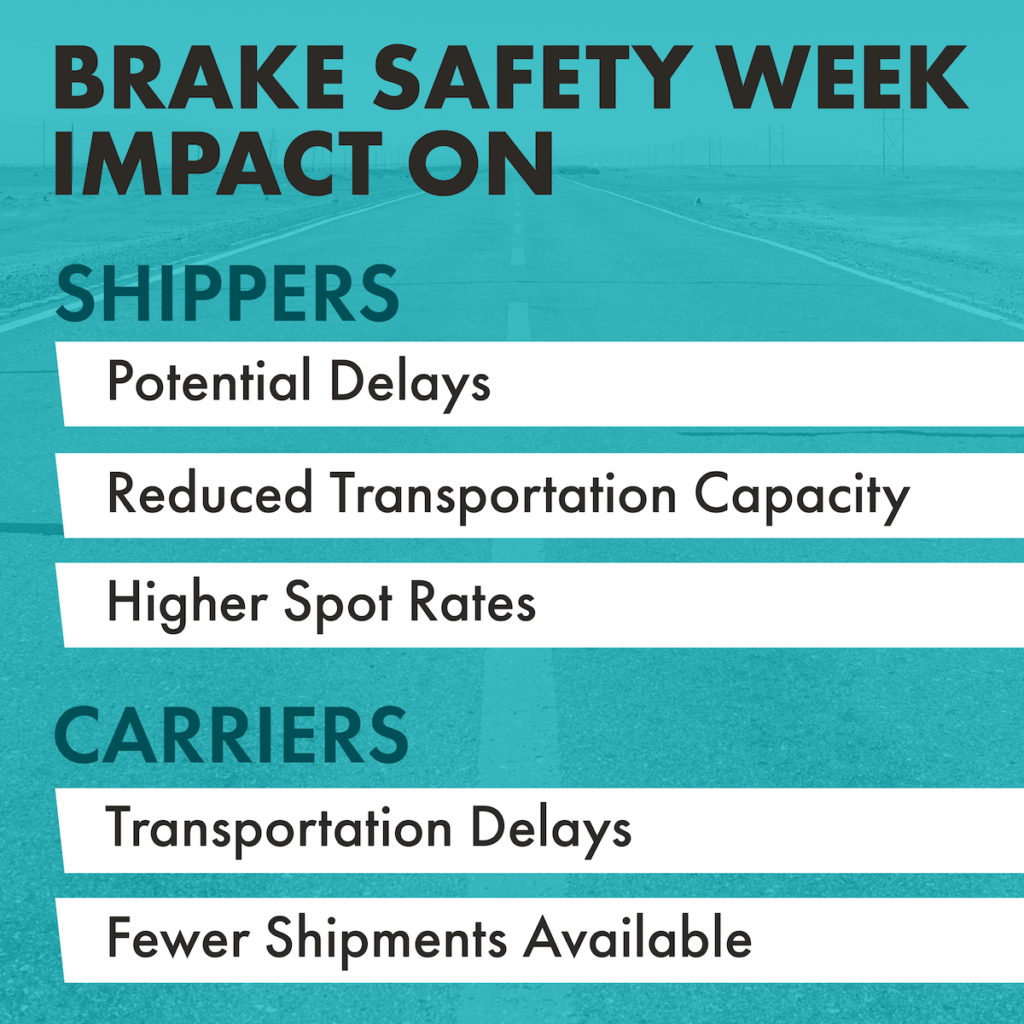
Brake Safety Week Impact on Shippers
Shippers may face potential delays, see reduced transportation capacity, and likely higher spot rates.
Potential Delays
There can be potential delays due to the brake safety inspections.
Reduced Transportation Capacity
The increased inspection effort sometimes leads carriers to strategically choose to close their business temporarily for the week to avoid any risk of fines or penalties. You might find it more difficult to secure reliable carriers for any last-minute shipments.
Higher Spot Rates
With the potential for fewer trucks available and delays, spot rates can be heightened during this time.
Brake Safety Week Impact on Carriers
Carriers are similarly affected, so there is the potential for delays and less freight volume.
Transportation Delays
Just like shippers, carriers should expect to see potential delays in the movement of traffic due to the increased inspections. This could disrupt your operations.
Fewer Shipments Available
Shippers may choose to plan around this week, reroute certain shipments, or even look into alternative modes. Less freight may be available during this week.
How to Prepare for Brake Safety Week:
Shippers
Ensure Documentation Accuracy
Double-check all shipment documentation. Ensure it is accurate and complete to avoid delays during any unexpected inspections.
Communicate Sensitive Shipment Needs
If you have any special requirements or time sensitivities, communicate this well in advance. This helps your logistics provider plan effectively. Any last-minute communication risks delays.
Find Alternatives
Consider alternative transportation modes or routes if you expect any delays.
Keep Customers Aware
Be proactive and communicate potential delays during this week to your customers to manage expectations.
Share Any Concerns
Discuss any concerns you might have with your logistics provider. They can offer valuable insights and help develop strategies to reduce disruptions.
Pricing Awareness
Be aware of possible higher spot rates during Brake Safety Week. When possible, plan shipments before or after this period to secure better pricing.
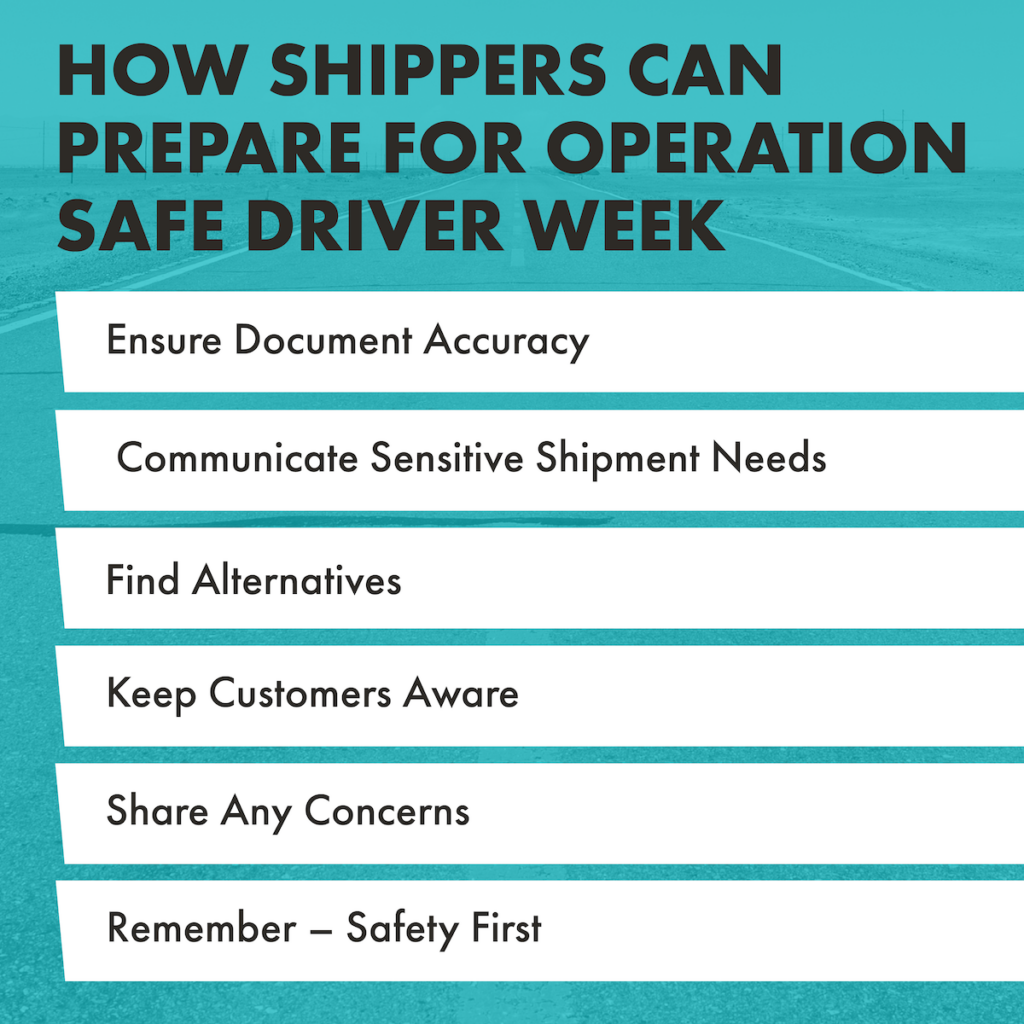
Carriers
Double-Check Credentials
Ensure all required credentials, like operating authority, hazmat endorsements, TWIC cards, and any other relevant permits, are current and accessible.
Driver Documents are Up to Date
Have drivers verify that all paperwork is up to date and accessible in case of inspection.
Vehicle Maintenance Check
Double-check that all vehicles have undergone any necessary preventive maintenance and are in top operating condition to avoid delays due to roadside repairs.
Prep Your Drivers
Make sure drivers are aware of this week and the potential for stops or delays. Train drivers on what to expect and the inspection procedure. Share this CVSA inspection checklist or tips sheet to help them improve their own brake maintenance checks. Make sure they know the channels to communicate any disruptions to their journey.
Book Ahead
Shippers may choose to reroute shipments, choose alternative modes, or plan around this week. Consider booking shipments well in advance for this week.
Remember – Safety First
The importance of this week is not disruptions but brake safety. This is a great time to remind drivers of their role in proper vehicle checks and maintenance.
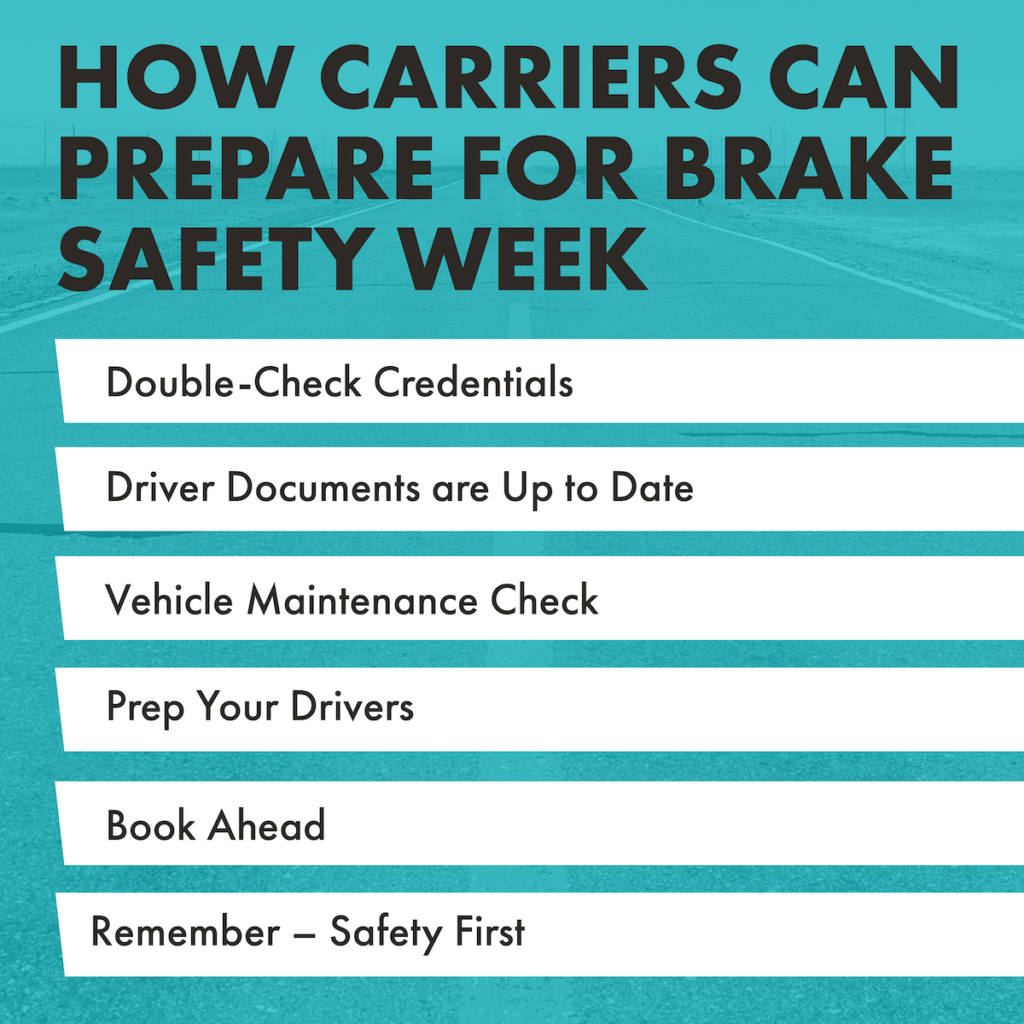
Let’s Work Together to Keep Our Roads Safe
We believe road safety is paramount. While Brake Safety Week might cause some temporary disruptions, it serves a vital purpose in keeping the importance of brake safety and its needed maintenance front of mind.
By staying informed and taking proactive steps, you can likely see minimal effects of Brake Safety Week.
For additional opportunities to stay ahead of disruption to your business during Brake Safety Week, consider working with Trinity Logistics. We have over 45 years of experience helping thousands of shipper and carrier companies conquer more complicated shipping situations, like CVSA inspection weeks. We’re confident in our ability to make this week (and all others) a painless one for your business.
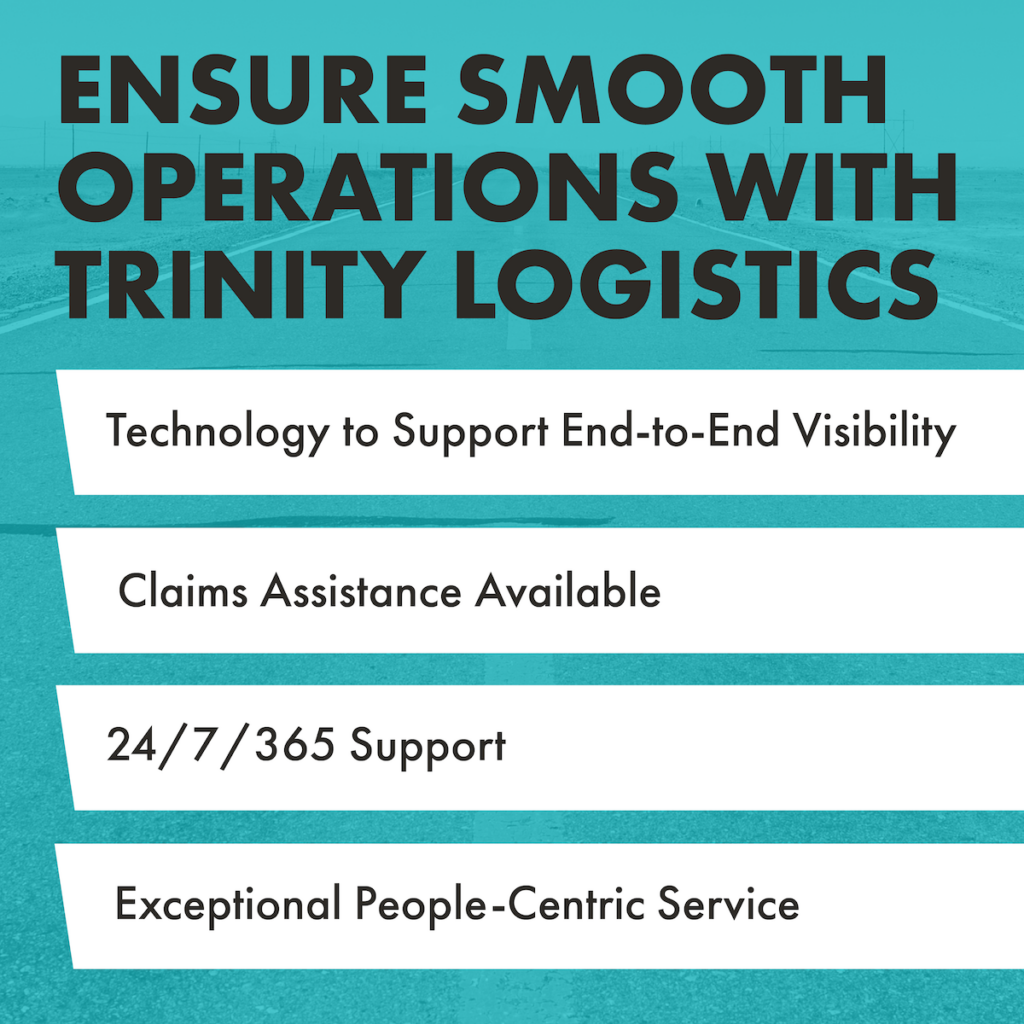
Don’t let your company get caught off guard by CVSA Operation Safe Driver Week, July 7th to July 13th, 2024!
Shippers and carriers, mark your calendars! Operation Safe Driver Week is approaching. While this annual event is designed to make our roadways safer, it’s also a crucial week for those in logistics. This pivotal time can impact operational efficiency for shippers and carriers alike. To be prepared, it’s important for all those involved in shipping freight to understand what Operation Safe Driver Week entails and its effect on the freight market.
- What is the CVSA?
- What is Operation Safe Driver Week?
- Impact on Shippers
- Impact on Carriers
- How Shippers Can Prepare
- How Carriers Can Prepare
- Let’s Work Together
What is the CVSA? What is Operation Safe Driver Week?
The Commercial Vehicle Safety Alliance (CVSA) is a non-profit organization dedicated to improving commercial motor vehicle safety through collaboration between law enforcement, industry stakeholders, and the public sector. In partnership with the Federal Motor Carrier Safety Administration (FMCSA), the CVSA launched the Operation Safe Driver initiative in 2007. The goal of this initiative is to reduce the number of deaths and injuries from crashes involving large trucks, buses, and cars.
This initiative includes an annual event, Operation Safe Driver Week. It aims to improve driver behavior through education and increased enforcement efforts, focusing on unsafe driving behaviors. It takes place across North America, so the U.S., Canada, and Mexico. Unlike the CVSA’s other two initiatives (International Road Check and Brake Safety Week), which solely focus on commercial drivers, this event affects all drivers on the road.
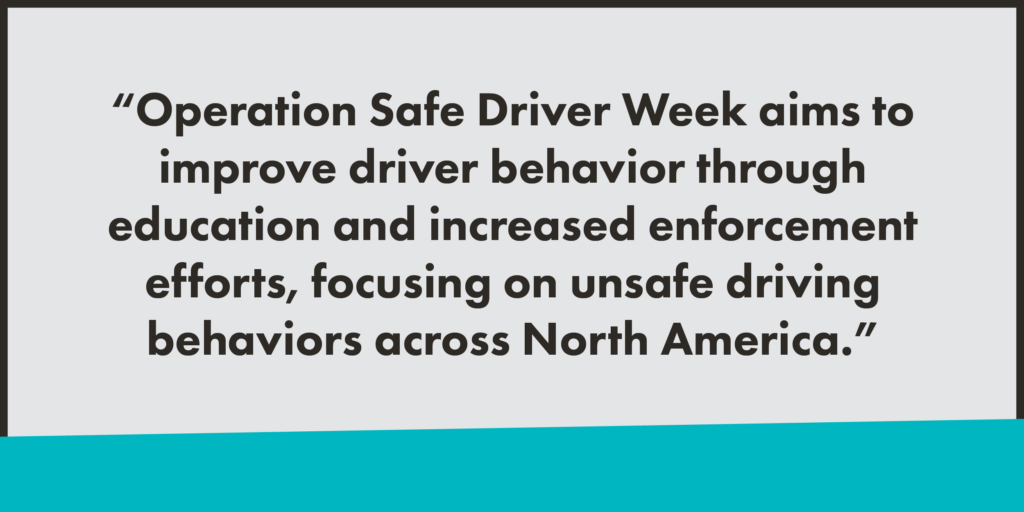
Each year has a primary focus with this year’s being reckless, careless, or dangerous driving. This includes actions like:
- Speeding
- Texting while driving
- Drunk or drugged driving
- Following too closely
- Driving too aggressively
- Improper lane changes
- Failure to obey traffic control devices
- Failing to use a seat belt
Those drivers identified are pulled over by law enforcement and issued warnings or citations.
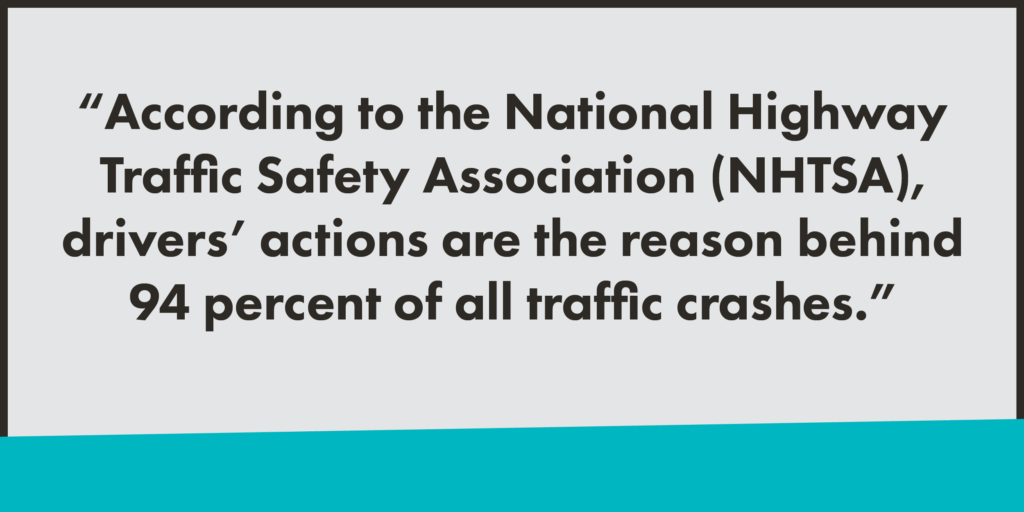
According to the National Highway Traffic Safety Association (NHTSA), drivers’ actions are the reason behind 94 percent of all traffic crashes. Research from the University of Missouri-Columbia has shown that interactions with law enforcement, not just education, are what brings change. During last year’s event, law enforcement interacted with 66,421 drivers! Drivers were informed and educated on how they can improve their driving behavior and do their part in reducing crashes.
Why Should I Be Concerned About Operation Safe Driver Week?
It’s important to be aware of when Operation Safe Driver Week takes place because of the impact it has on shipping freight. Even though it’s just one week out of the year, no one likes to be unprepared for potential disruption or delays to their business.
Operation Safe Driver Week Impact on Shippers
Shippers may face potential delays, see reduced transportation capacity, and likely higher spot rates.
Potential Delays
Increased enforcement activity can lead to potential delays due to any road stop inspections or pullovers.
Reduced Transportation Capacity
The increased enforcement effort sometimes leads carriers to strategically choose to close their business temporarily for the week to avoid any risk of fines or penalties. You might find it more difficult to secure reliable carriers for any last-minute shipments.
Higher Spot Rates
With the potential for fewer trucks available and delays, spot rates can be heightened during this time.
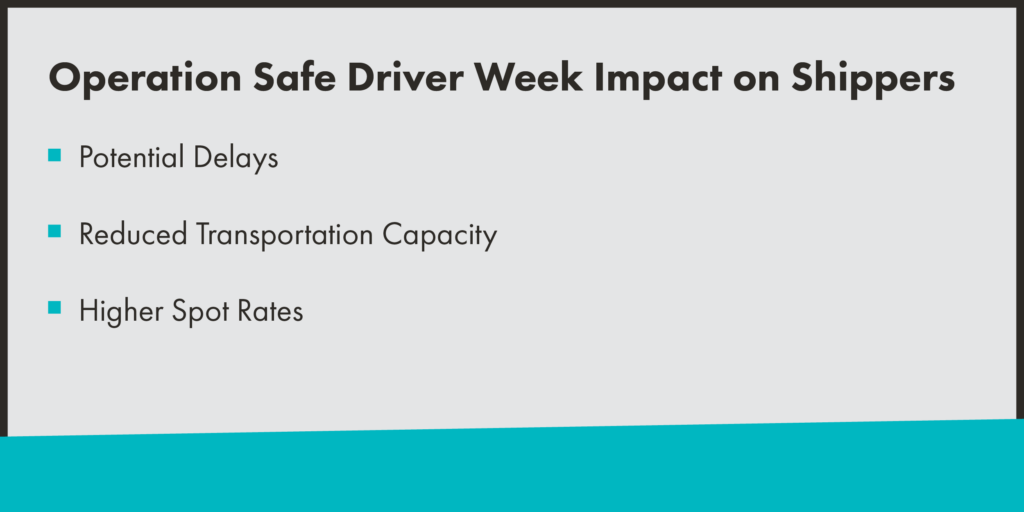
Operation Safe Driver Week Impact on Carriers
Carriers are similarly affected, and there is the potential for delays, less freight volume, and higher scrutiny from law enforcement.
Transportation Delays
Just like shippers, carriers should expect to see potential delays in the movement of traffic due to the increased enforcement. This could disrupt your operations.
Fewer Shipments Available
Shippers may choose to plan around this week, reroute certain shipments, or even look into alternative modes. Less freight may be available during this week.
Increased Law Enforcement
Expect to see increased law enforcement, so more eyes will be looking for unsafe driver behavior, and drivers may receive fines.
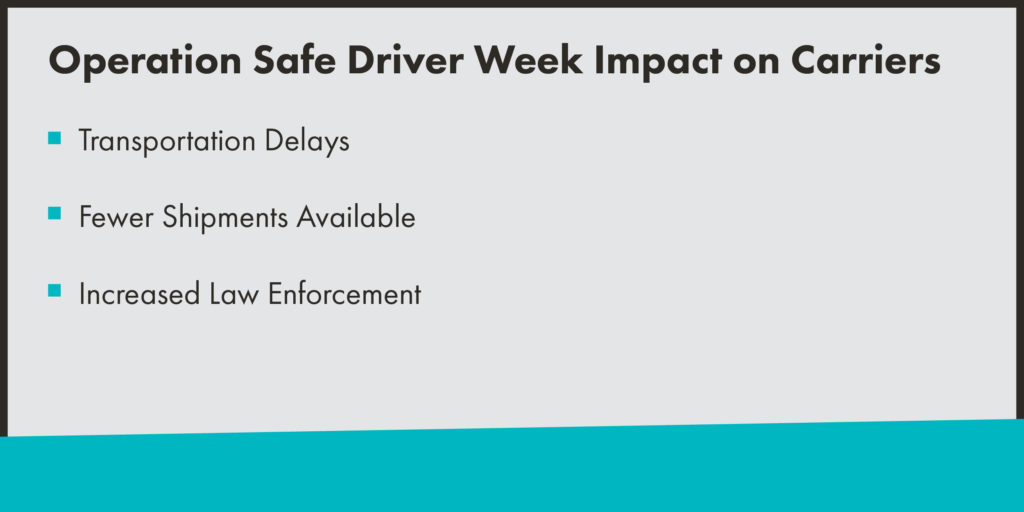
How to Prepare for Operation Safe Driver Week:
Shippers
Ensure Documentation Accuracy
Double-check all shipment documentation. Ensure it is accurate and complete to avoid delays during any unexpected inspections.
Communicate Sensitive Shipment Needs
If you have any special requirements or time sensitivities, communicate this well in advance. This helps your logistics provider plan effectively. Any last-minute communication risks delays.
Find Alternatives
Consider alternative transportation modes or routes if you expect any delays.
Keep Customers Aware
Be proactive and communicate potential delays during this week to your customers to manage expectations.
Share Any Concerns
Discuss any concerns you might have with your logistics provider. They can offer valuable insights and help develop strategies to reduce disruptions.
Pricing Awareness
Be aware of possible higher spot rates during Operation Safe Driver Week. When possible, plan shipments before or after this period to secure better pricing.
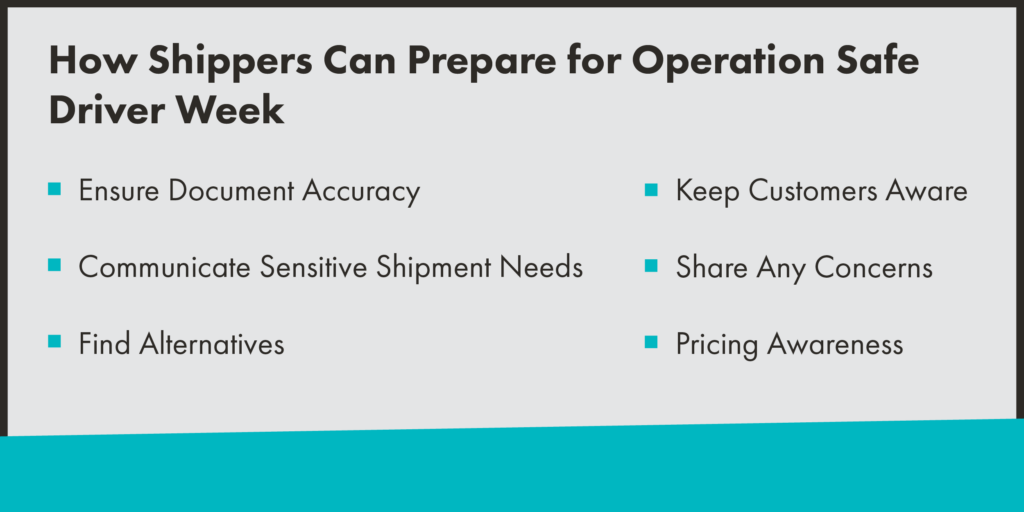
Carriers
Double-Check Credentials
Ensure all company credentials, like operating authority, hazmat endorsements, TWIC cards, and any other relevant permits, are current and accessible.
Driver Documents are Up to Date
Have drivers verify that all paperwork is up to date and accessible in case of inspection.
Vehicle Maintenance Check
Double-check that all vehicles have undergone any necessary preventive maintenance and are in top operating condition to avoid delays due to roadside repairs.
Prep Your Drivers
Make sure drivers are aware of this week and the potential for stops or delays. Train drivers on proper procedures for interacting with law enforcement. Make sure they know the channels to communicate any disruptions to their journey.
Book Ahead
Shippers may choose to reroute shipments, choose alternative modes, or plan around this week. Consider booking shipments well in advance for this week.
Remember – Safety First
The importance of this week is not disruptions but road safety. This is a great time to talk with drivers about safe driving behavior. You could also help educate the public on proper driving behavior when interacting with trucks. Remember, this week benefits everyone who shares the road.
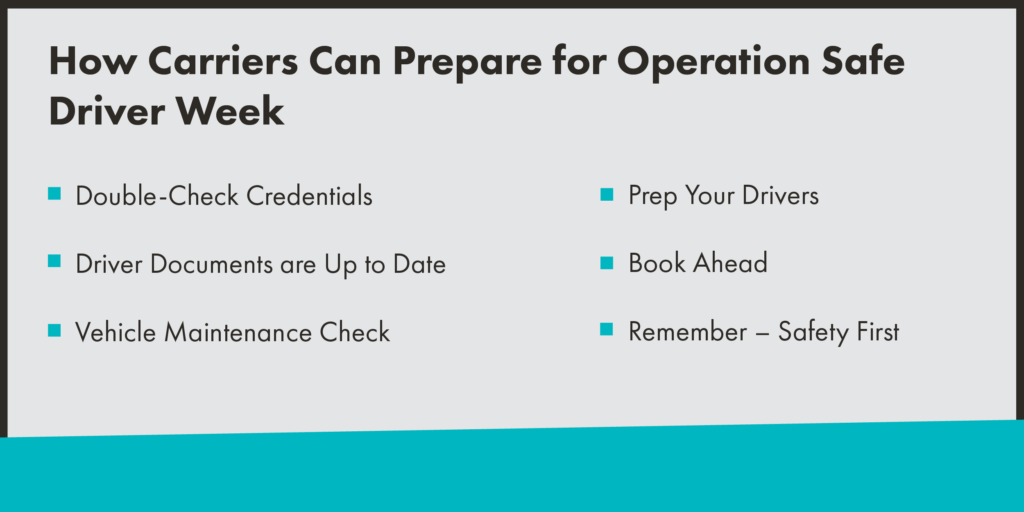
Let’s Work Together to Keep Our Roads Safe
We believe road safety is paramount. While Operation Safe Driver Week might cause some temporary disruptions, it serves a vital purpose in promoting safe driving behaviors.
By staying informed and taking proactive steps, you can likely see minimal effects of Operation Safe Driver Week.
For additional opportunities to stay ahead of disruption to your business during Operation Safe Driver Week, consider working with Trinity Logistics. We have over 45 years of experience helping thousands of shipper and carrier companies conquer more complicated shipping situations, like CVSA inspection weeks. We’re confident in our ability to make this week (and all others) a painless one for your business.
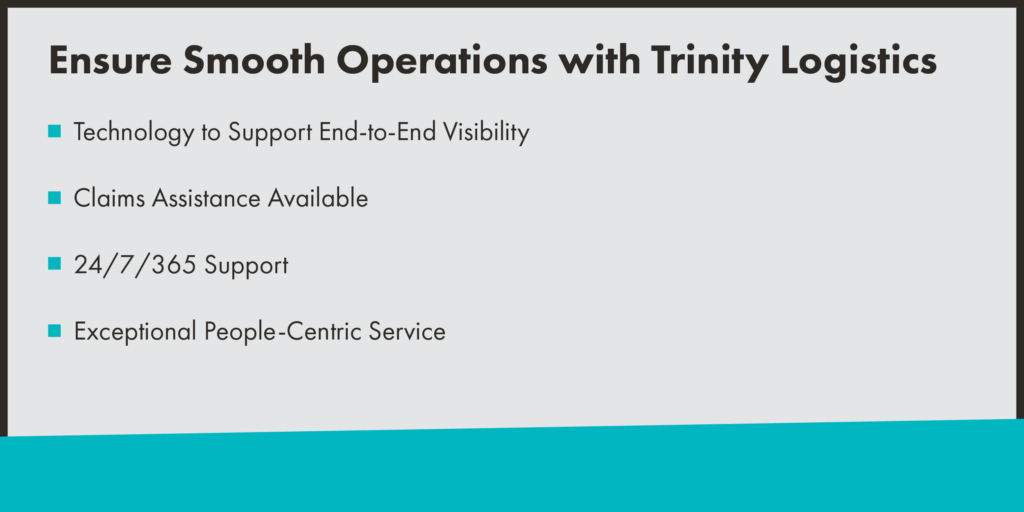
After several record setting years, 2023 saw shifts to the freight market. How did the 2023 freight market affect shipper and carrier businesses? Did other businesses have the same struggles as yours? Are they expecting to face similar difficulties in 2024? How are their partner relationships?
Trinity Logistics wanted to get answers to these questions for you, so we asked a random sample of our shipper and carrier relationships to gauge the effect 2023 had on their business and what their expectations for 2024 in our first Freight Market Survey. Here’s what we found out:
2023 SHipper & Carrier Data: Freight Market Survey Results
Past Challenges – Same, But Different
Considering the recent turndown of demand and the freight market, it’s not a big surprise that money was the biggest issue for shippers and carriers alike. Shippers answered that transportation costs were their biggest challenge in 2023, with supply chain delays/disruption and capacity not far behind. Low rates and increasing operating costs were the main challenges facing carriers.
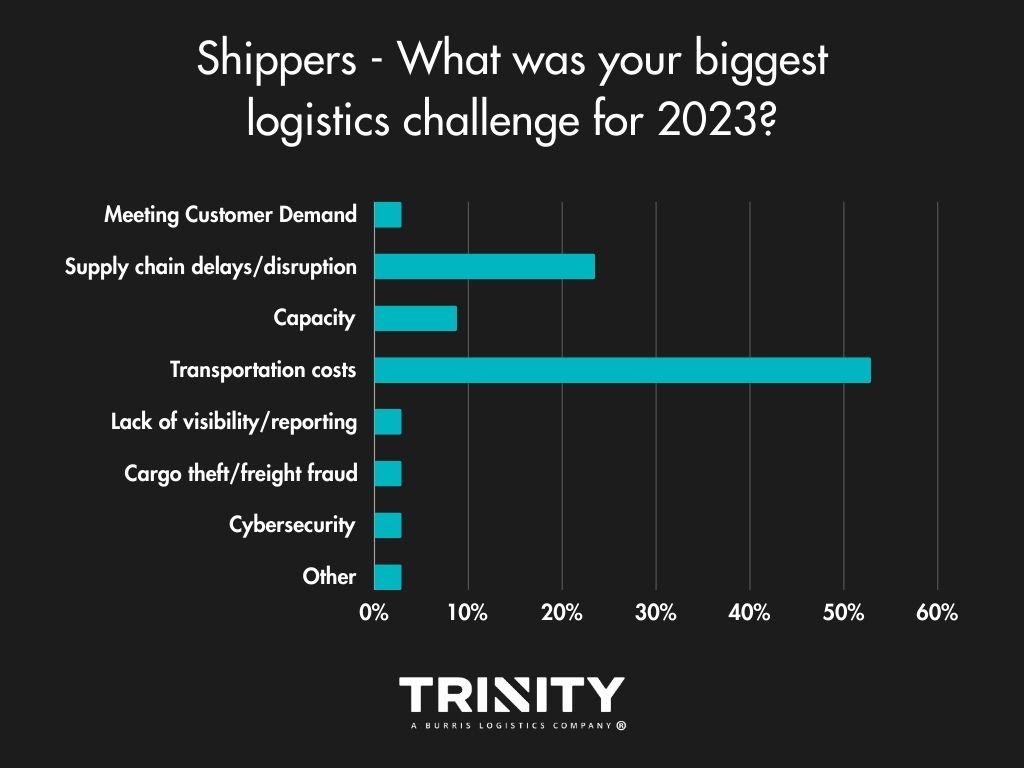
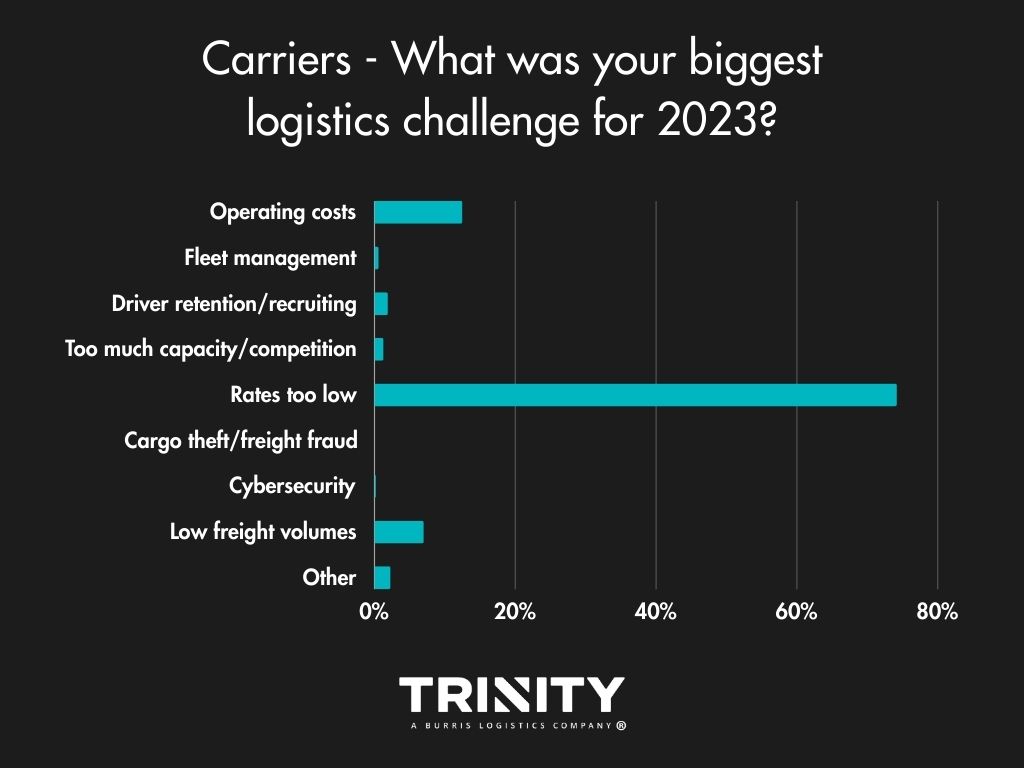
Business Impact – Could Have Been Better
Even with the change in consumer demand trending downwards throughout 2023, most shippers answered that their year was good overall. Carriers on the other hand seemed to face a rougher year in business with over half of them stating their year could have been better or was poor.
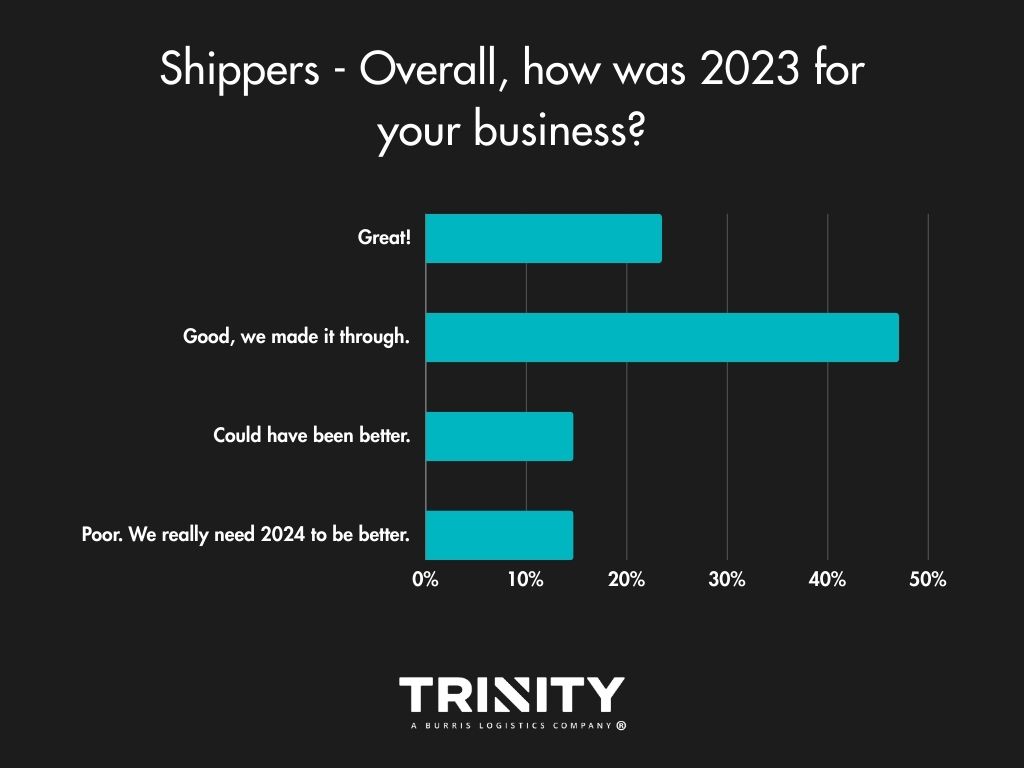
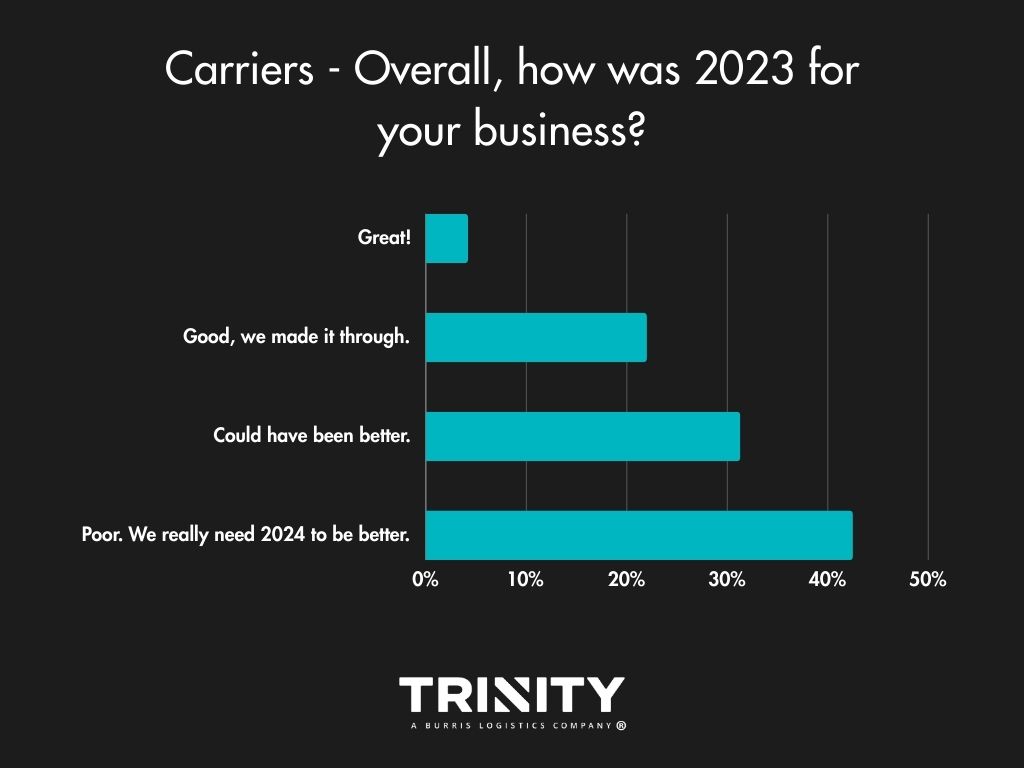
A LOOK INTO 2024
Future Challenges – Money Problems
2024 isn’t looking much different in terms of challenges compared to 2023. Shippers look to have the same financial challenges as they did in 2023 with transportation costs, supply chain delays/disruption, and decreased demand being the top concerns selected. Carriers are still concerned about low rates, operating costs, and low freight volumes hurting their businesses.
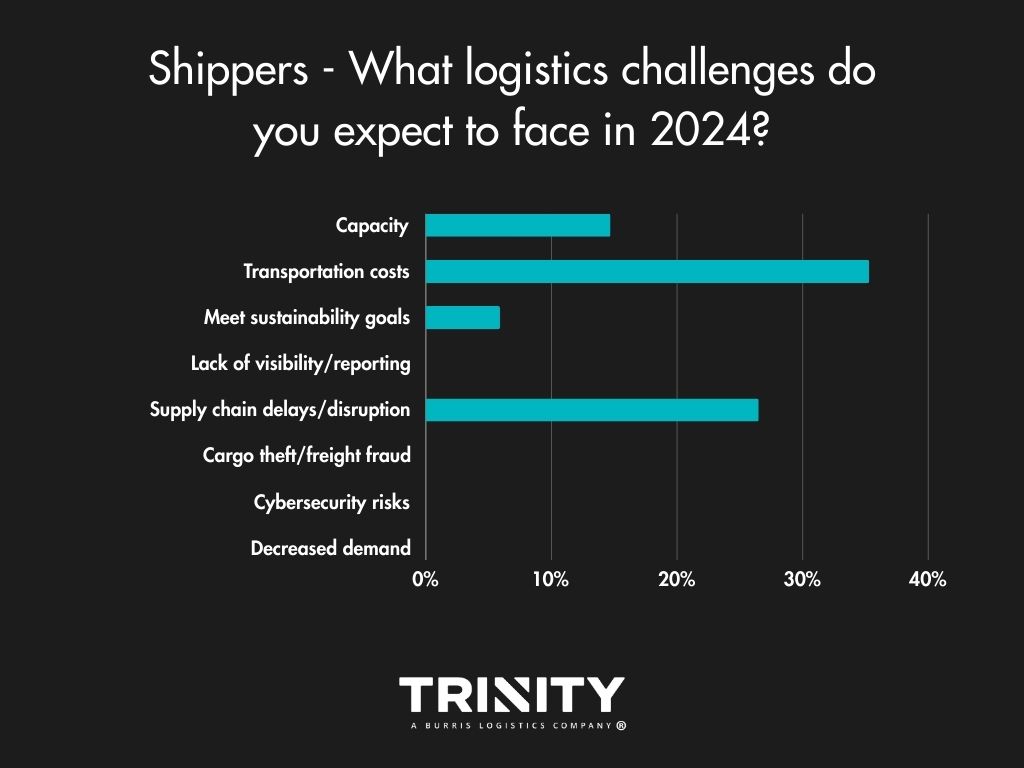
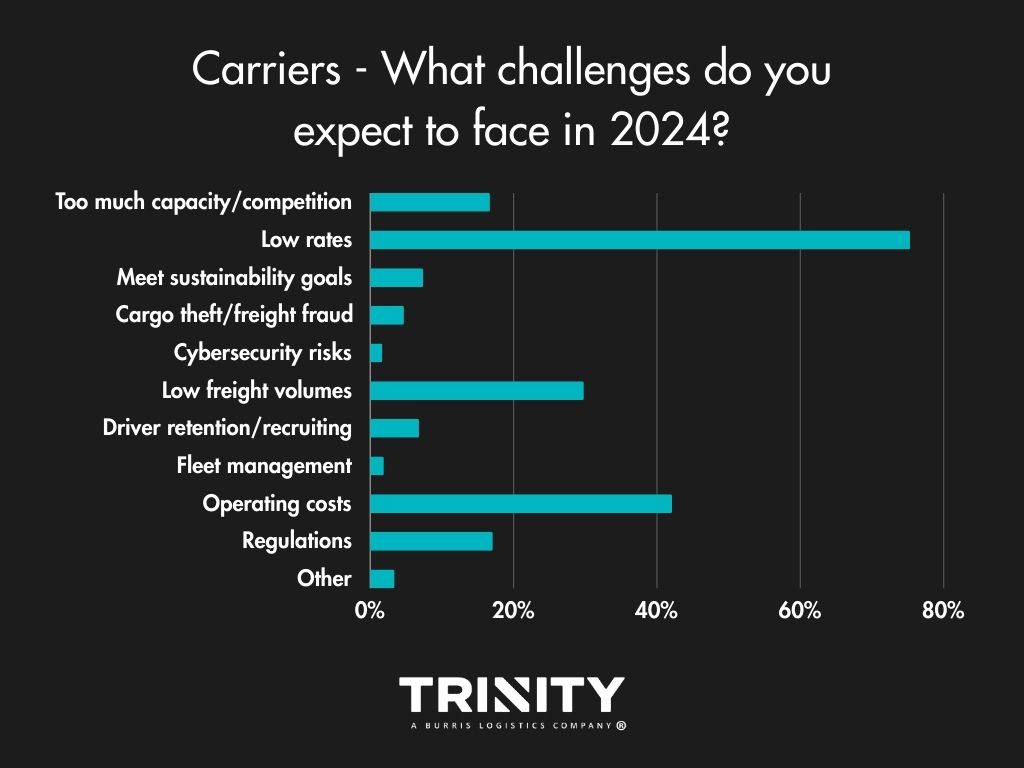
Hot Trends
Even though transportation costs are shippers’ strongest concerns in their previous answers, it seems the increased amount of supply chain disruptions and delays we’ve all experienced in these recent years have hit a nerve, with the majority answering that supply chain resilience is the trend their business is most interested in. Cybersecurity also looks to be a growing interest.
Carriers on the other hand, interestingly enough, look to the recent trend of Artificial Intelligence (AI). Also, as noted in the comment boxes of our “Other” option, increased rates and better fuel prices were trends they’d like to see in 2024.
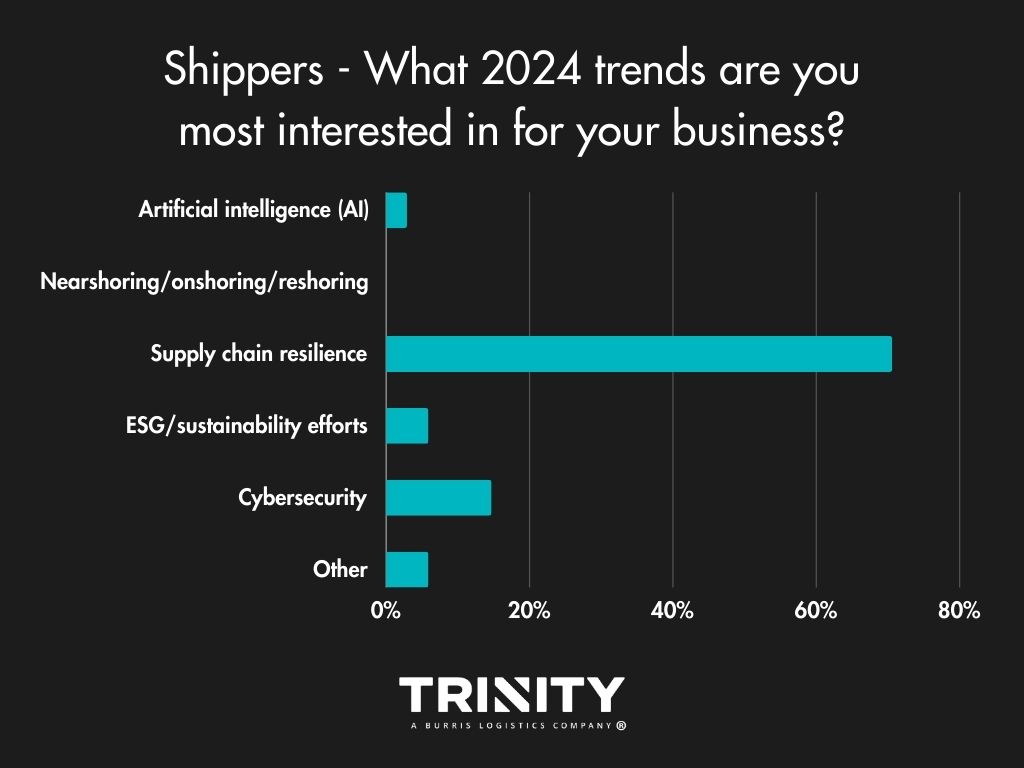

Load Volumes & Capacity – Slightly Positive Outlook
Overall, shippers are slightly more optimistic for 2024, thinking it won’t bring any change or the change it brings will be positive. Most think load volumes will stay the same or there will be a little more in freight volumes this year. As for truck capacity, they think it will be the same as 2023 or slightly tighter.
Carriers also think 2024 will bring more freight volumes and that capacity will likely stay the same or get tighten slightly versus 2023.
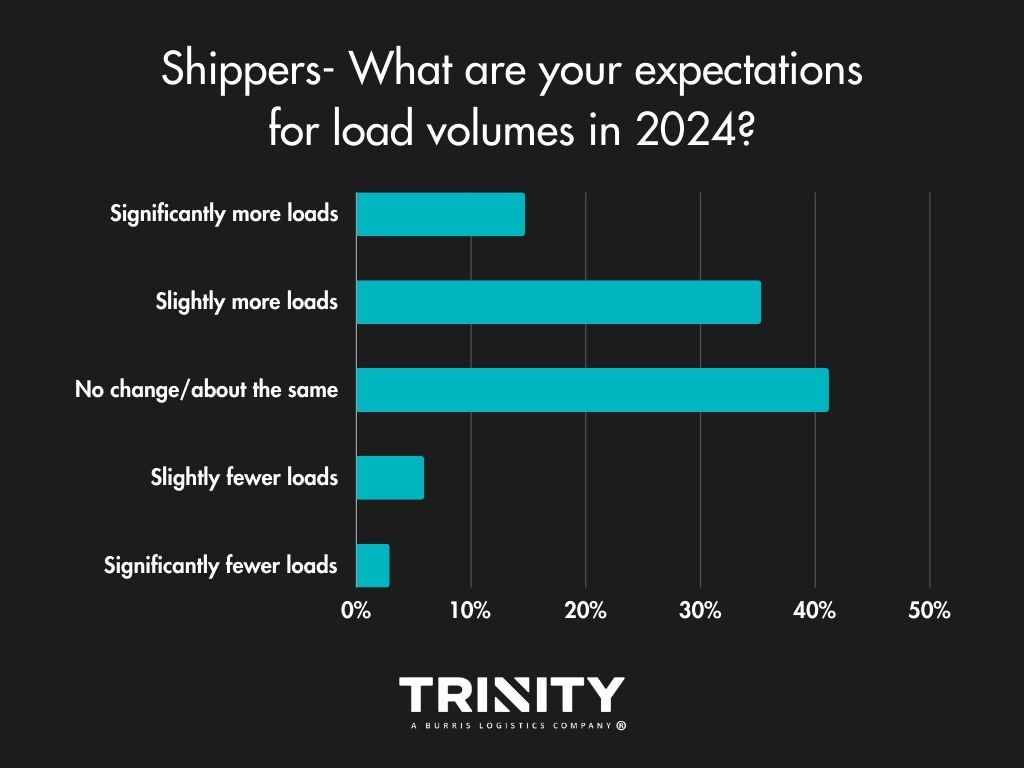
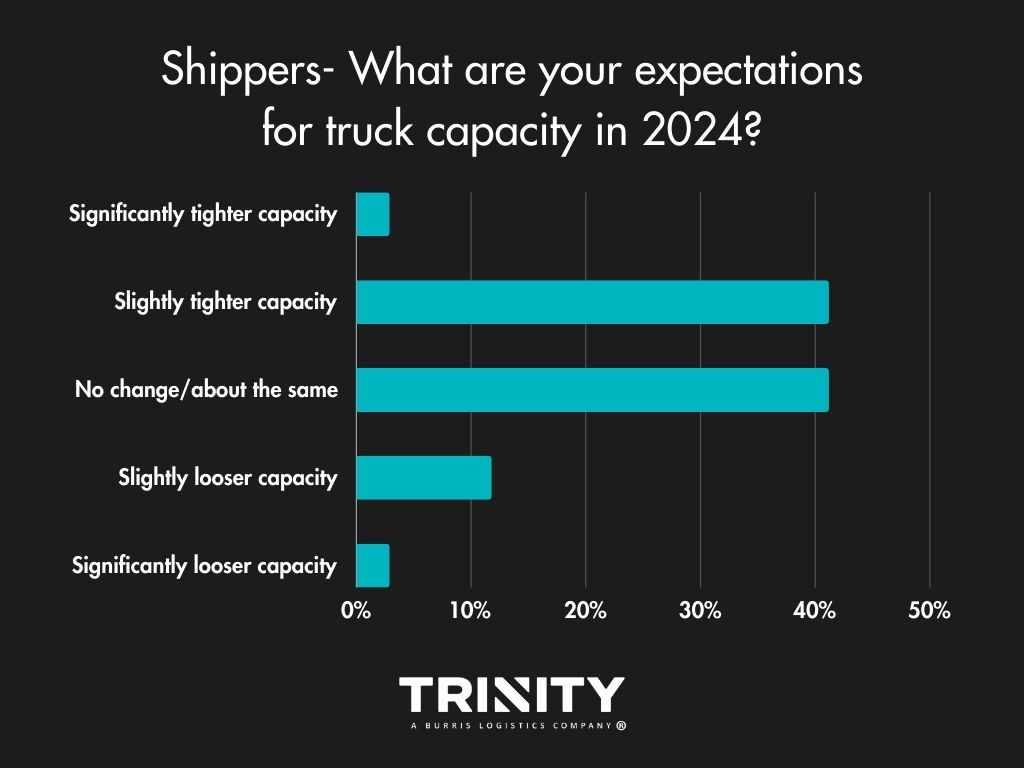
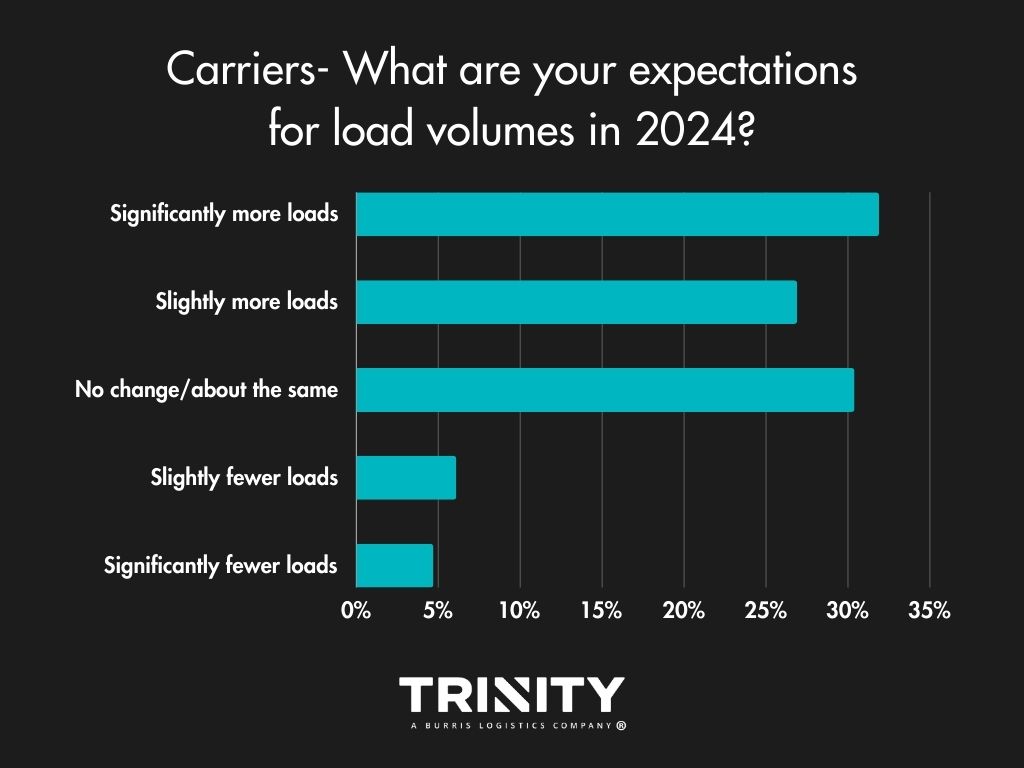
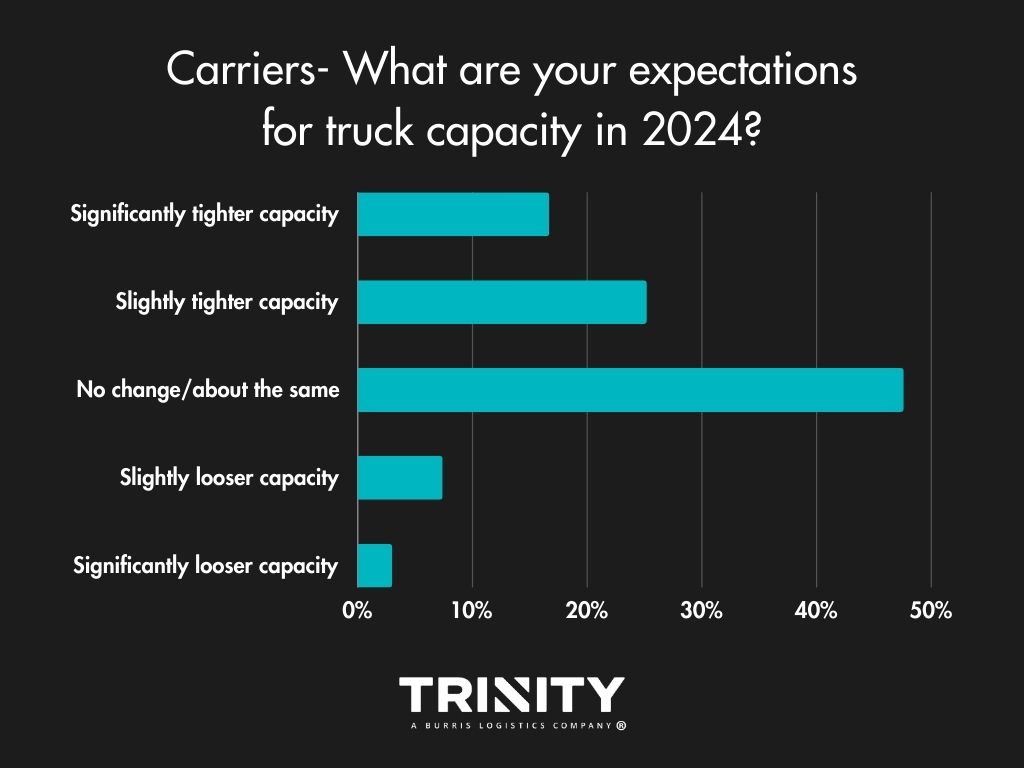
Spot or Contract?
Year-over-year, shippers aren’t looking to change much in terms of which market they turn to. Most look to continue to put most of their freight on the spot market.
For carriers, there looks to be some change anticipated. In 2023, most carriers ran spot market freight but in 2024, over half of them look to haul contracted freight.
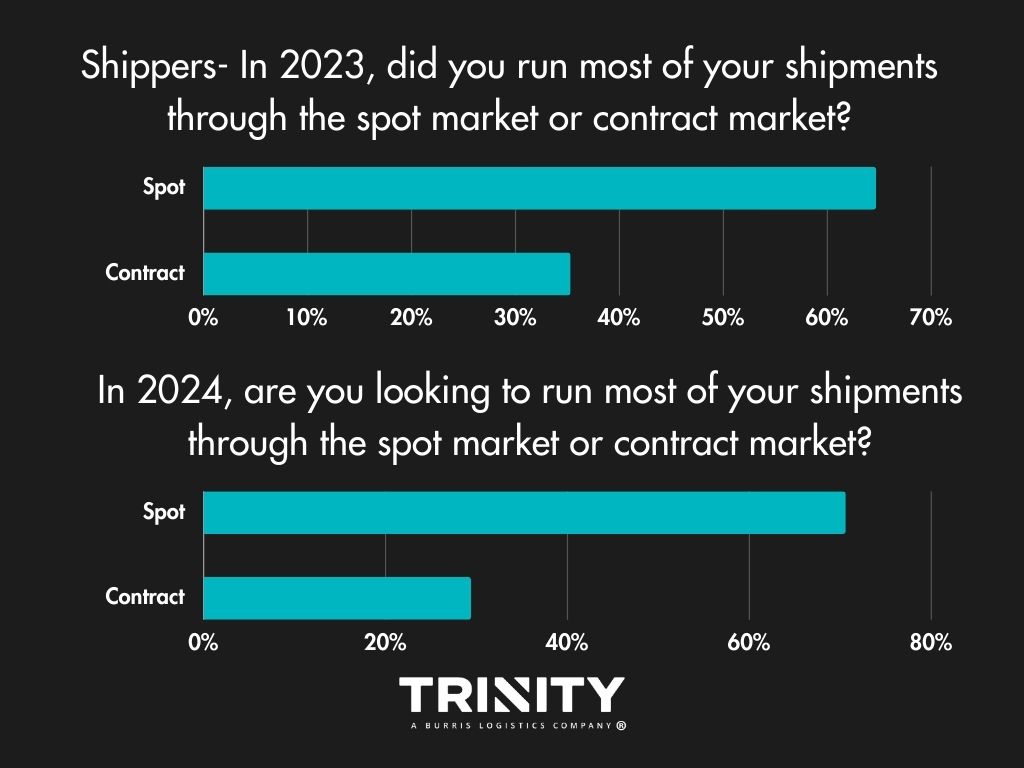
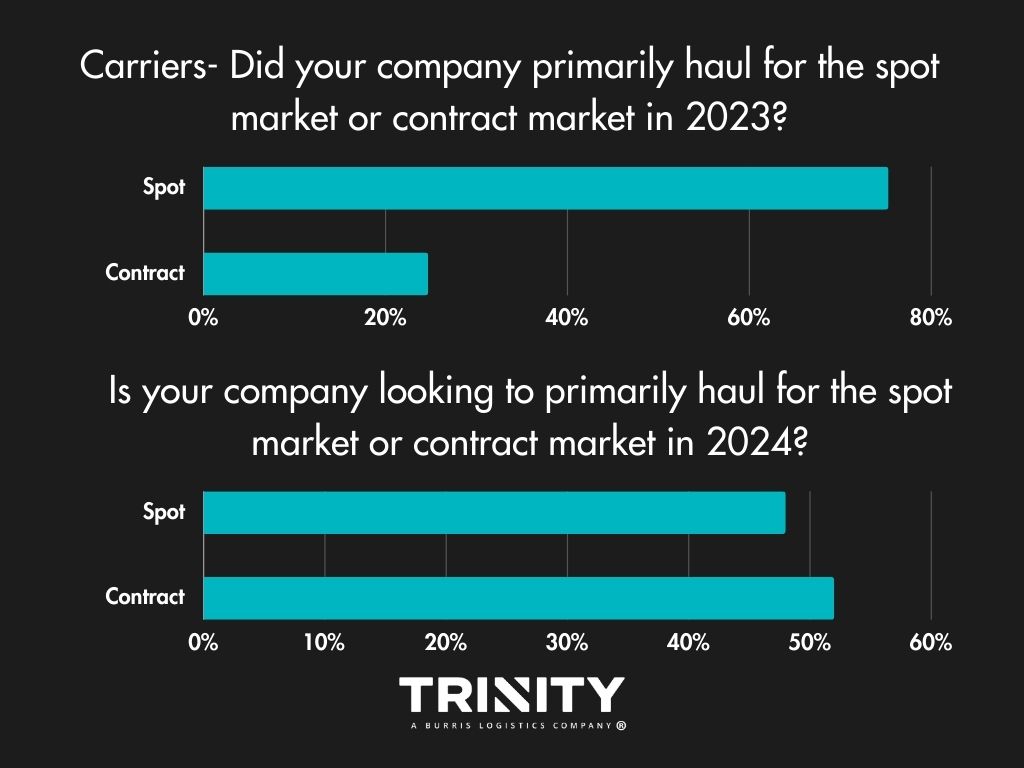
Do Shippers Have a TMS?
It’s 2024, so you’d think most shippers would have a transportation management system (TMS), and no surprise, they do. For those that don’t and answered, it seems they did not have a good experience with one in the past or don’t know enough about them.
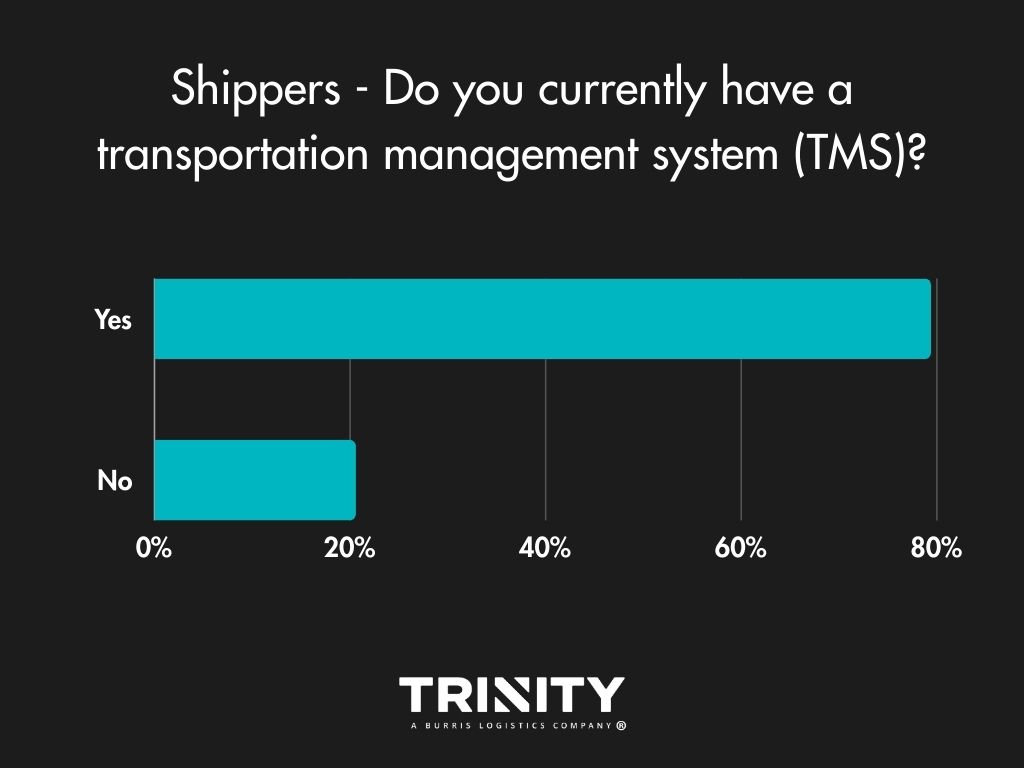
Brokers Are the Way to Go
When asked how they like to move their shipments, most shippers use a mix of carriers and third-party logistics providers (3PLs) or just 3PLs. A few do use their own trucks. For those that do outsource to 3PLs, they usually just stick to one provider.
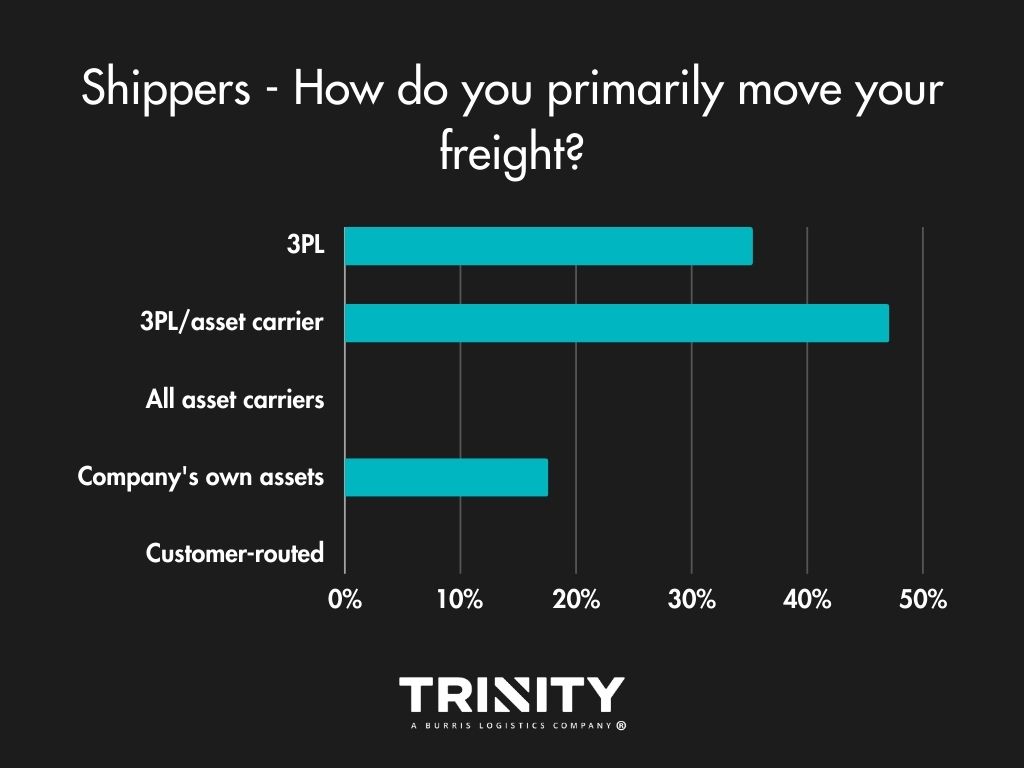
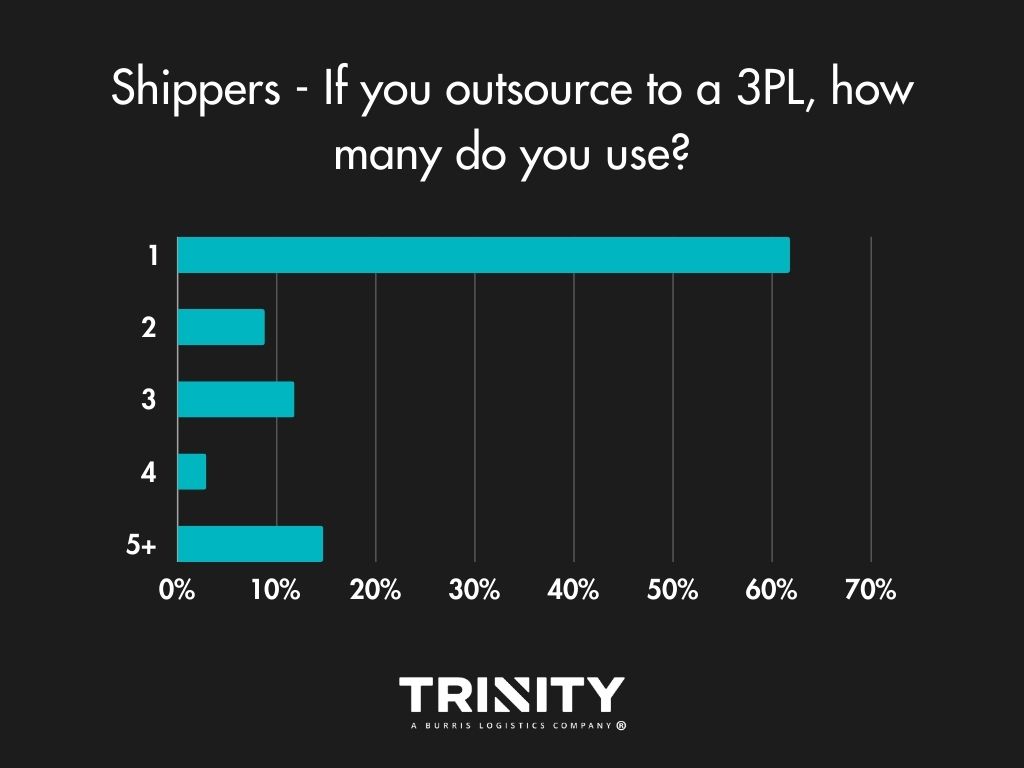
Shippers most often look to a 3PL for help with their everyday shipments, for transportation management, visibility, and access to their capacity. The main reason shippers choose not to work a 3PL for their logistics? They don’t like the risk.
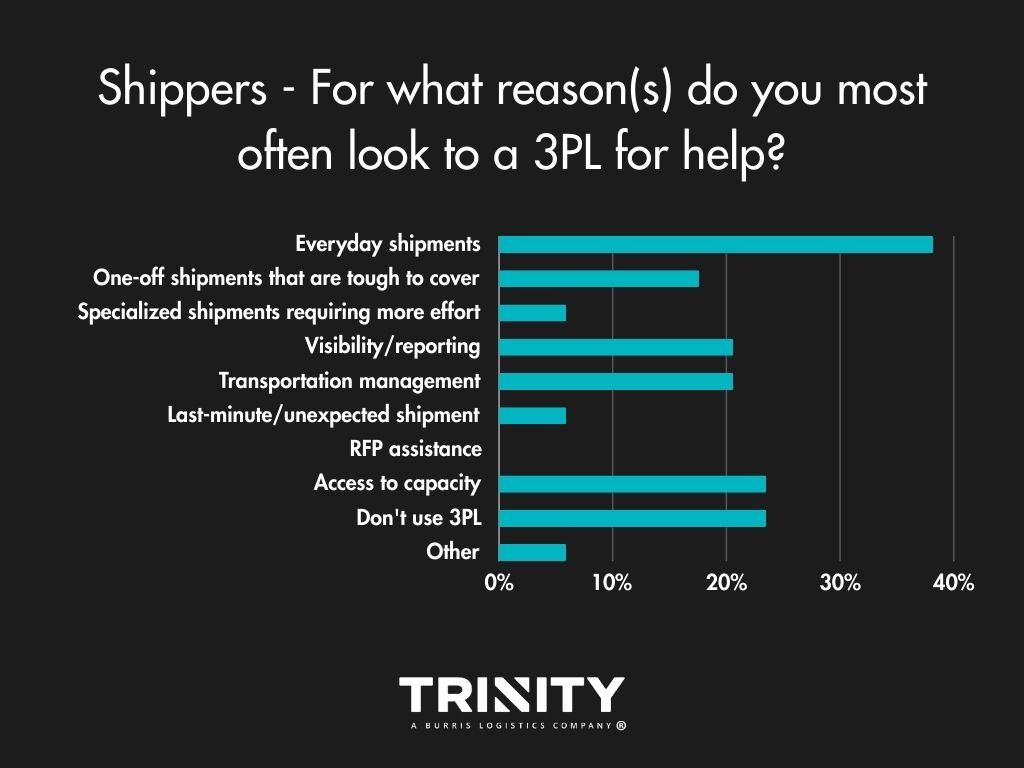
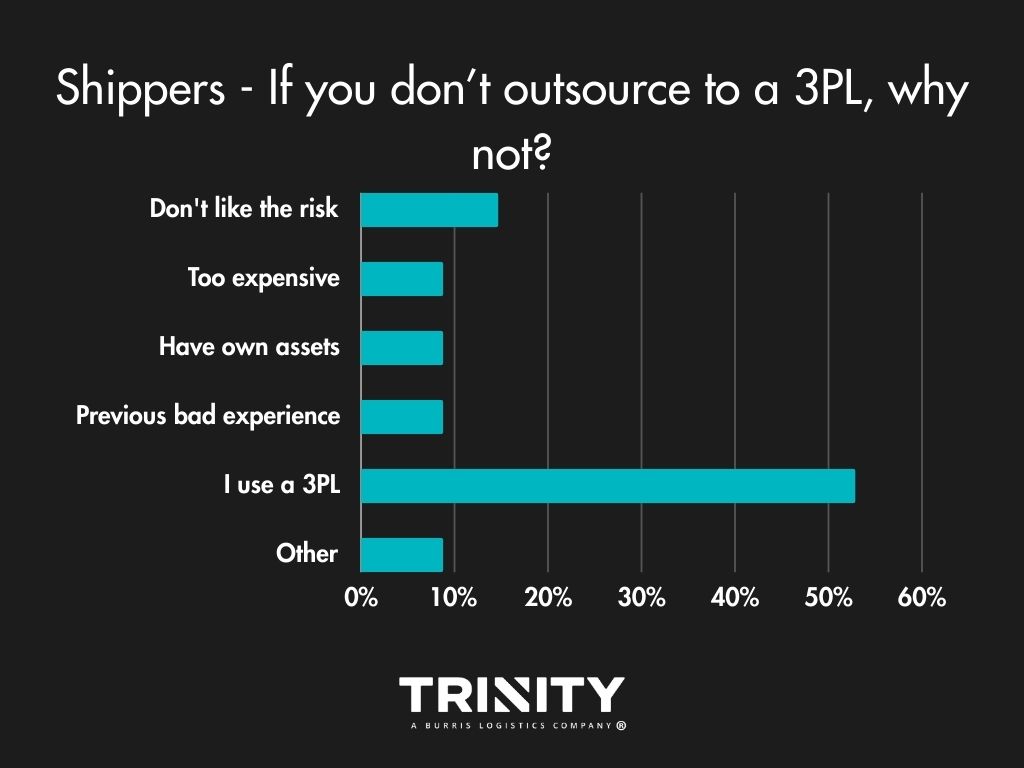
Transportation Modes – Staying Consistent
Overall, shippers aren’t looking to change what transportation modes they use for their shipments. Truckload and less-than-truckload (LTL) are the primary modes they like to use, with a little diversification sprinkled in.
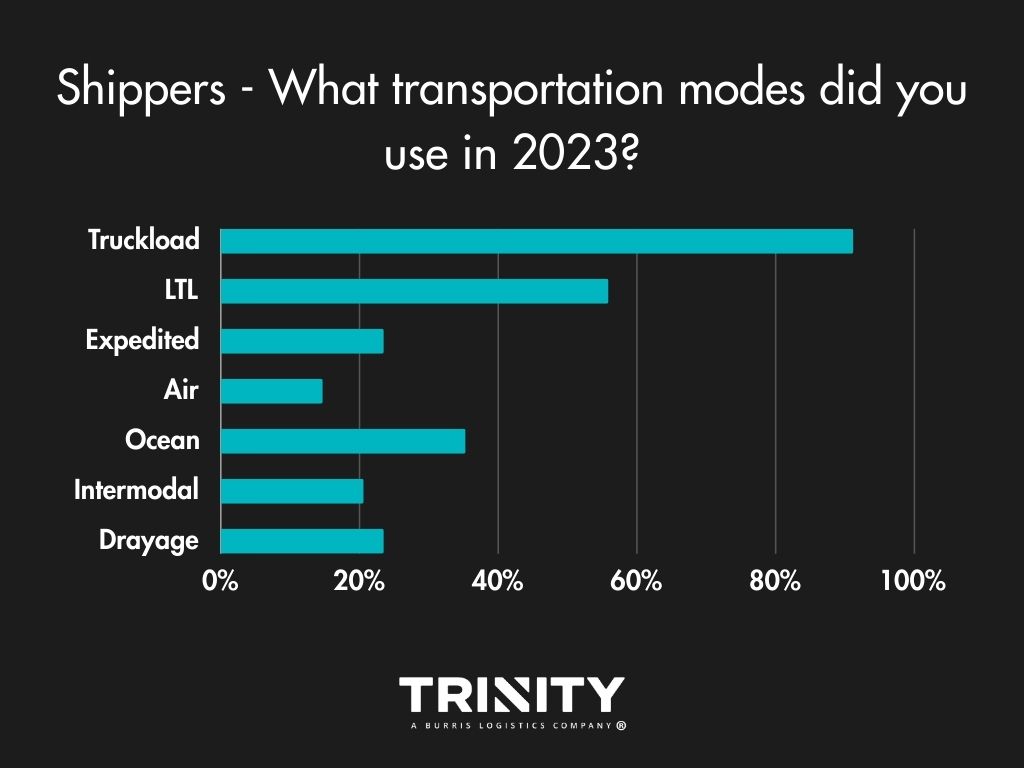
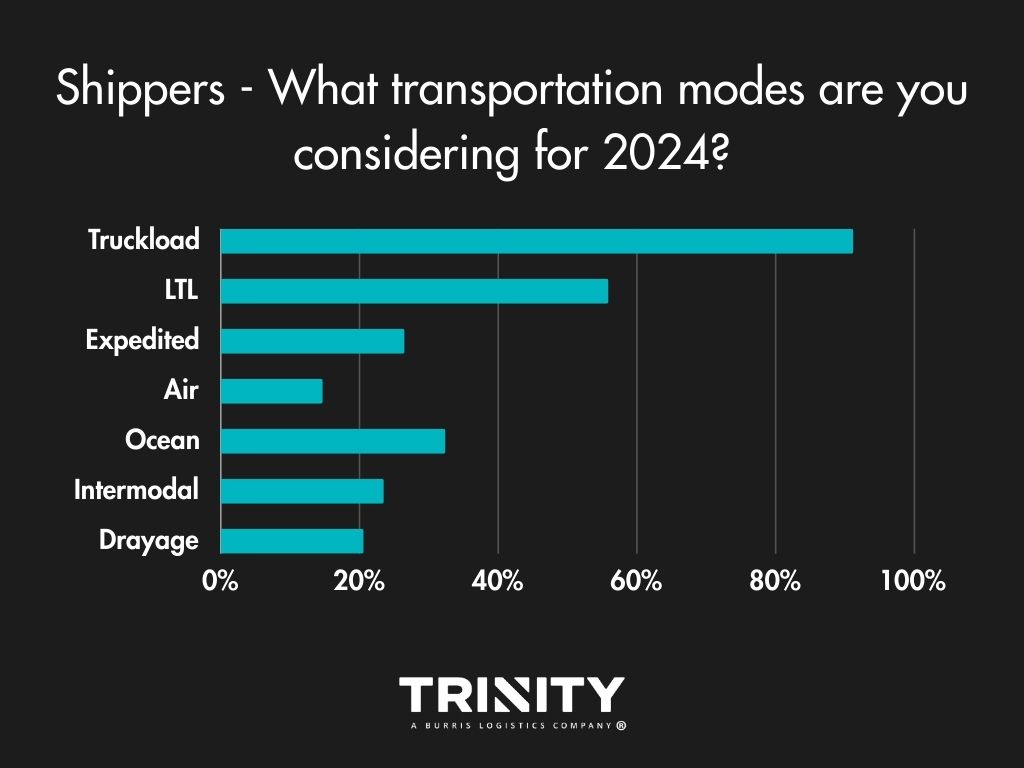
Exceptional Service Stands the Test of Time
When it comes to their logistics partners, shippers find the most value in receiving exceptional service, with costs coming in as a close second.
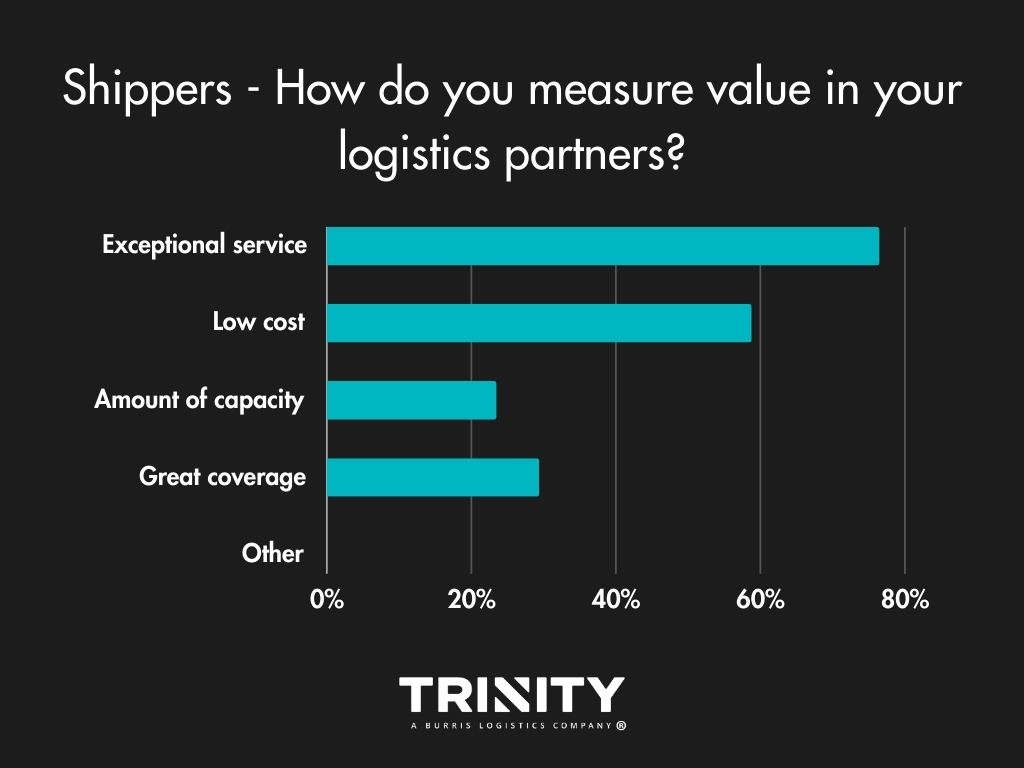
Most Wanted: Long Mileage, Flatbed Shipments
When it comes to mileage, most carrier companies tend to run long-hauls or a mix of short and long shipments. Flatbed hauls are the type of shipments most carriers like to haul with dry van coming in as a close second.
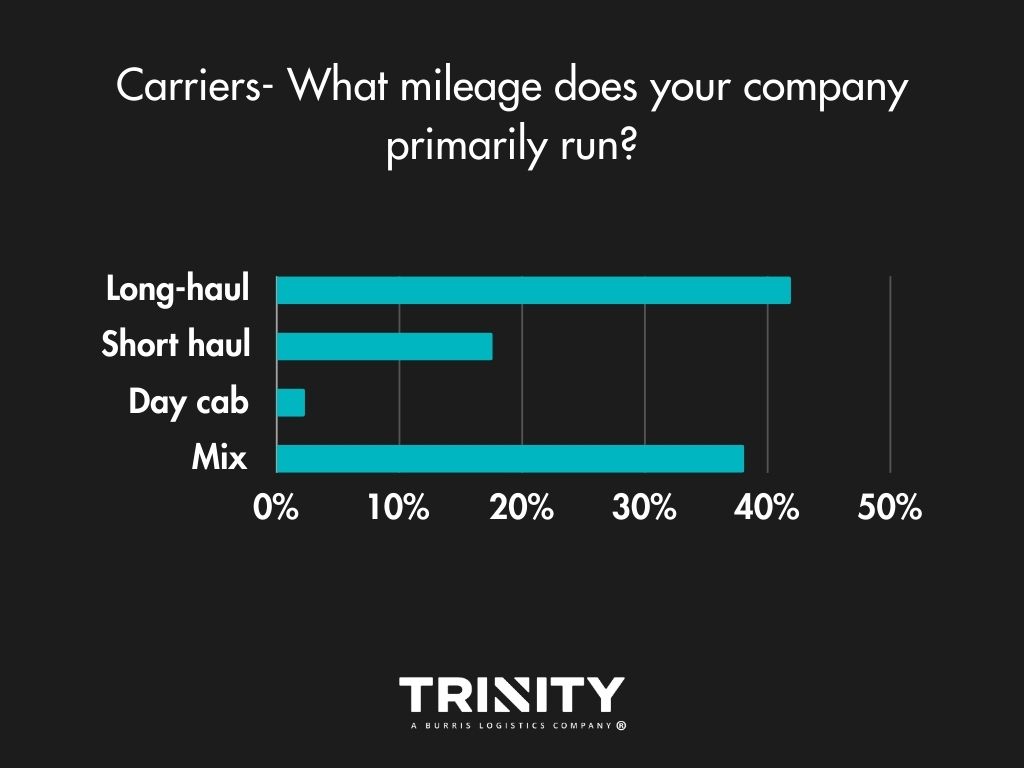
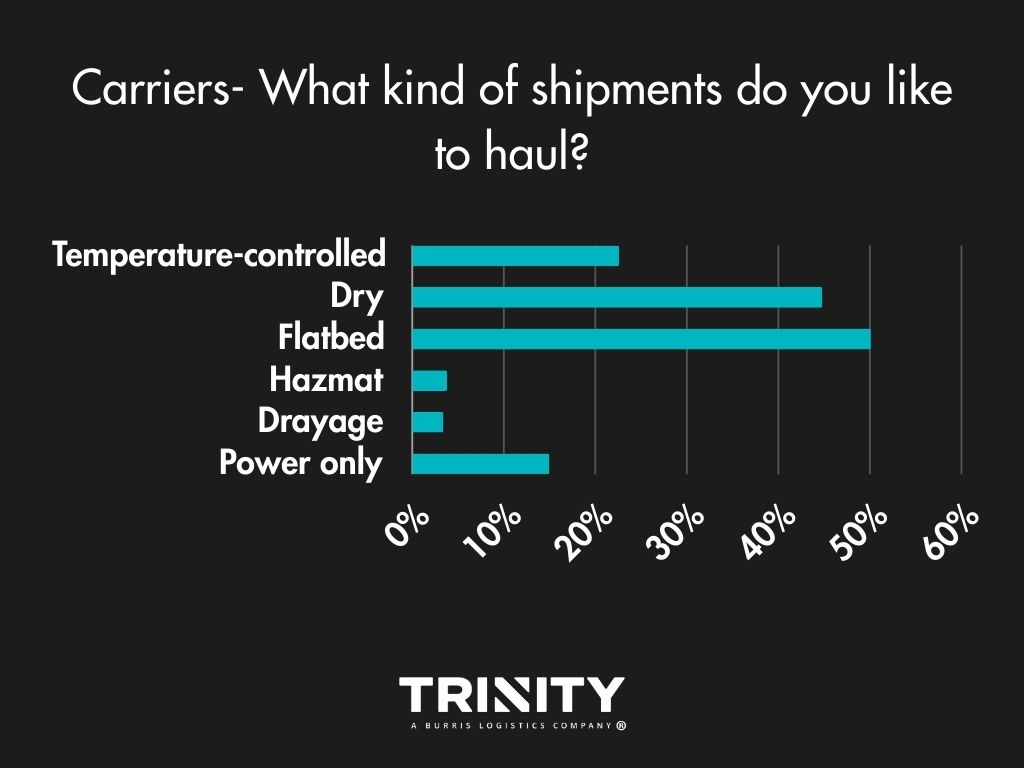
Load Boards are the Way
With 74 percent selecting this option, load boards are the norm for carriers to find available shipments. Sometimes they use their shipper relationships, and occasionally they make use of a 3PL.
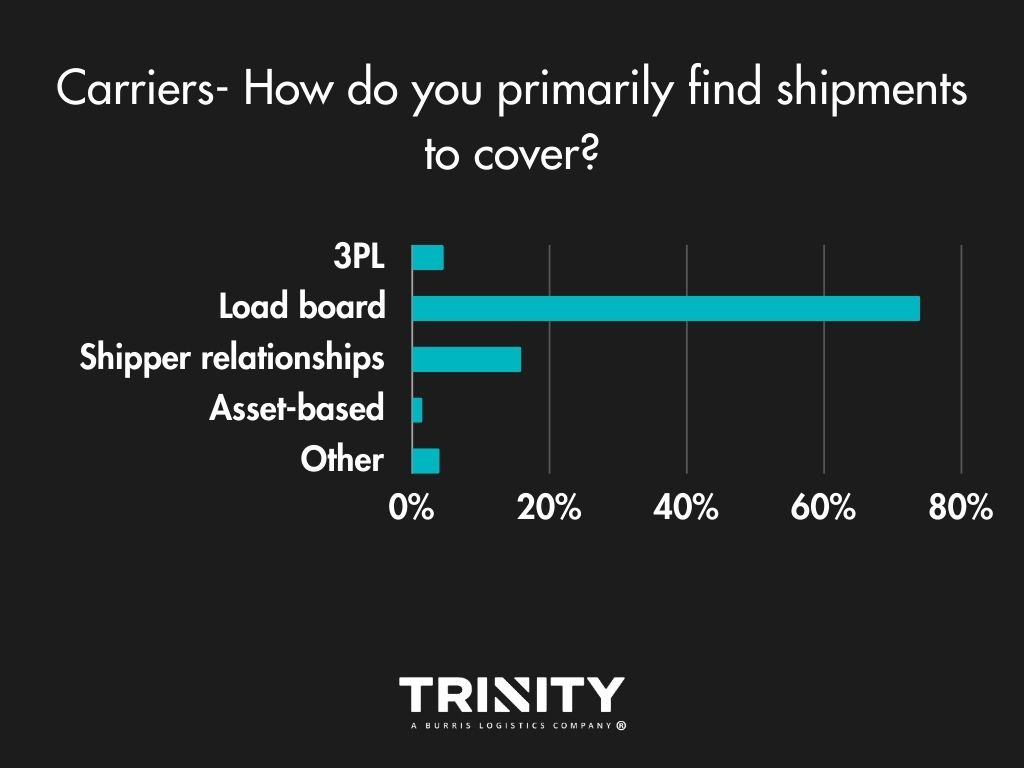
3PLs – Expanding a Carrier’s Reach
Carriers most often look to a 3PL for help with gaining access to available shipments that they wouldn’t have otherwise. Covering backhauls are another big reason carriers reach out to a 3PL.
For those that choose to not work with a 3PL, it’s often because of money; rates not being high enough. Surprisingly in the comments, many are not familiar with what a 3PL or freight broker is as well.
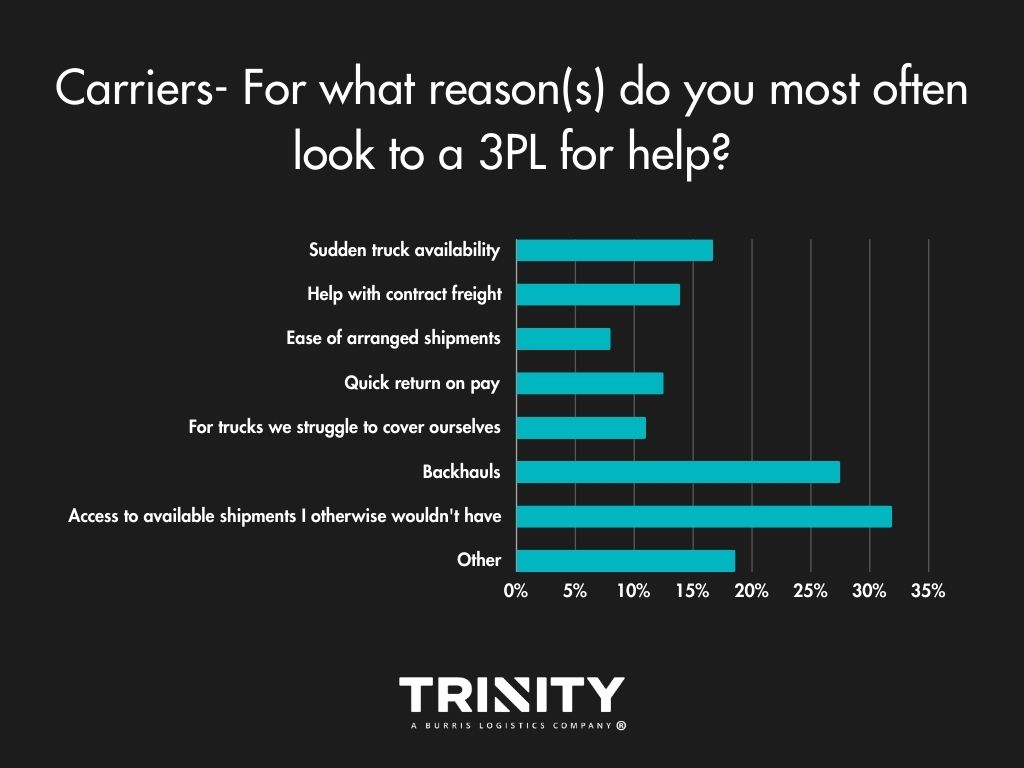
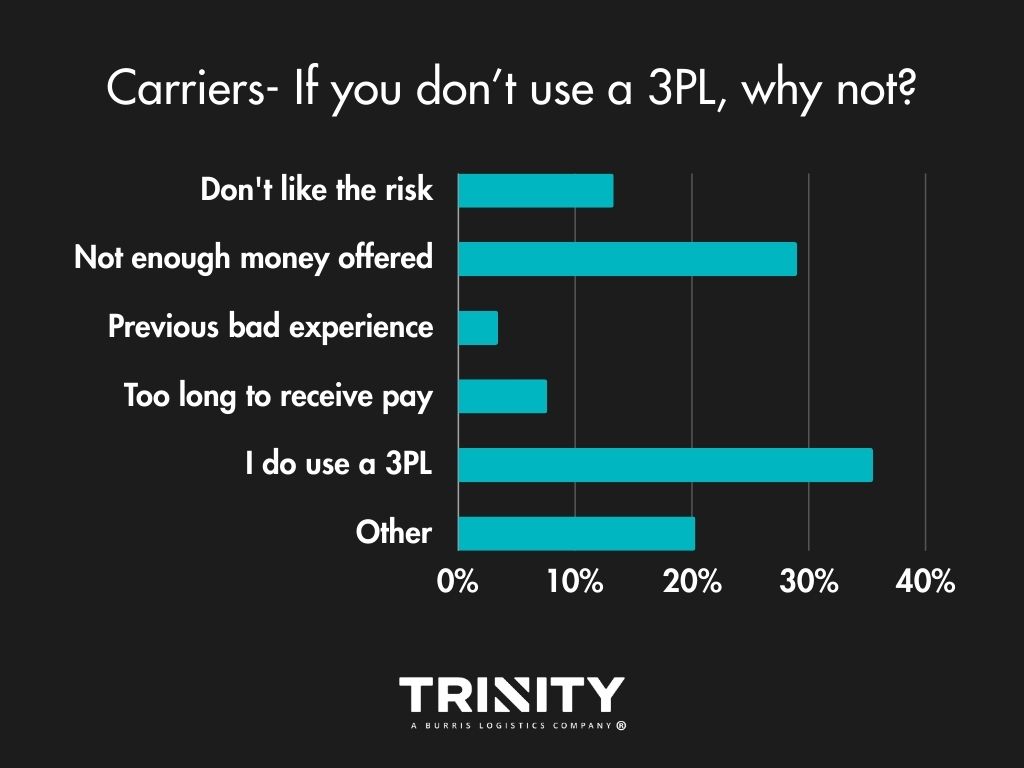
When it comes to measuring value in their 3PL partners, most carriers want good rates and great communication.
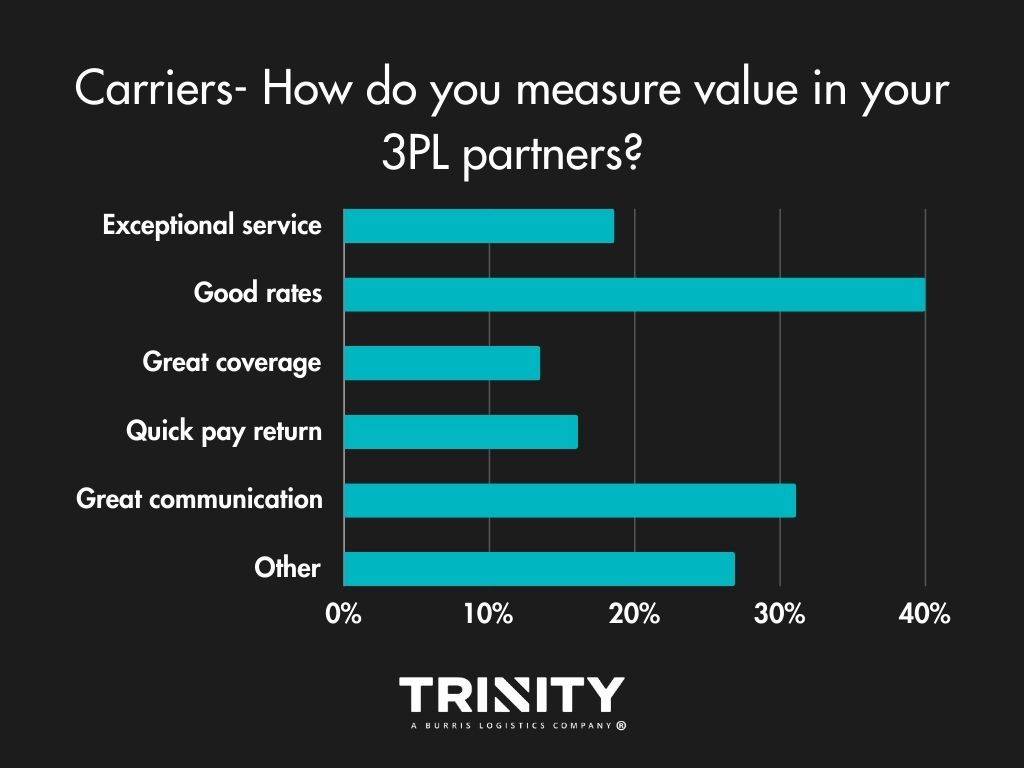
Fraud Concerns Growing
Fraud and scams have been growing in the industry, so we wanted to know what carriers think about it. Carriers are most worried about double and triple brokering affecting their businesses compared to concerns of identity theft or cargo theft.
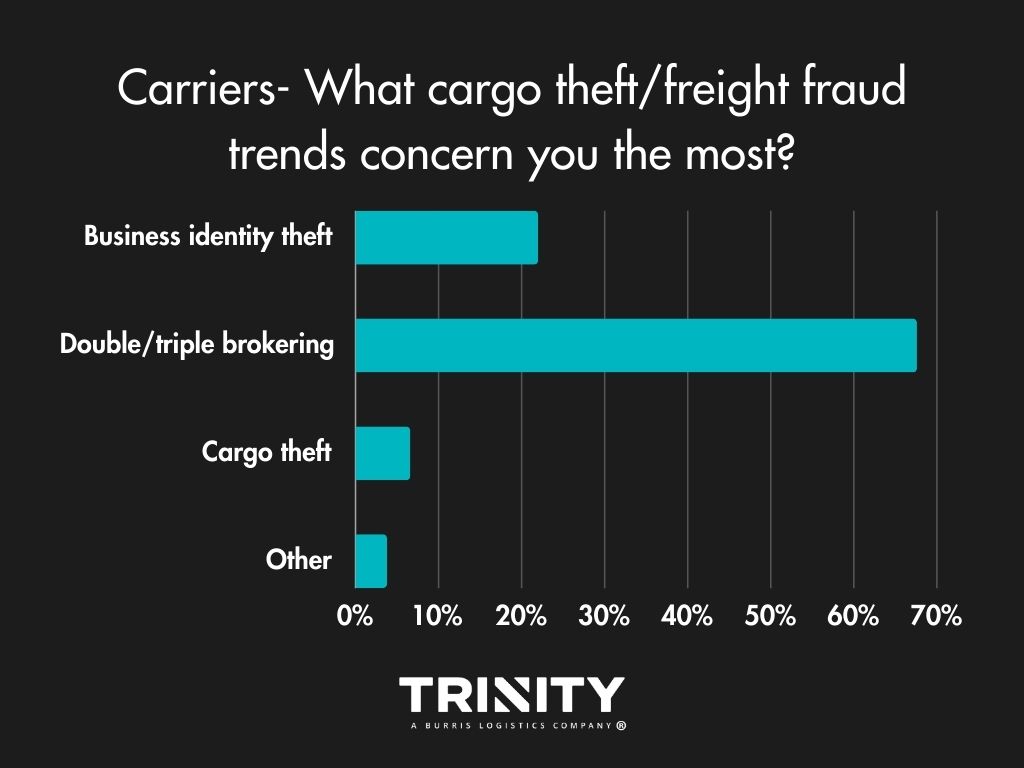
A carrier that receives their freight pay in a timely manner is a happy carrier. No one knows that better than us! If you’ve ever had a lengthy delay between hauling a load and receiving your freight pay, there may be a simple explanation. To avoid any hang-ups when hauling with Trinity Logistics and to get paid as quickly as possible, always follow these tips.
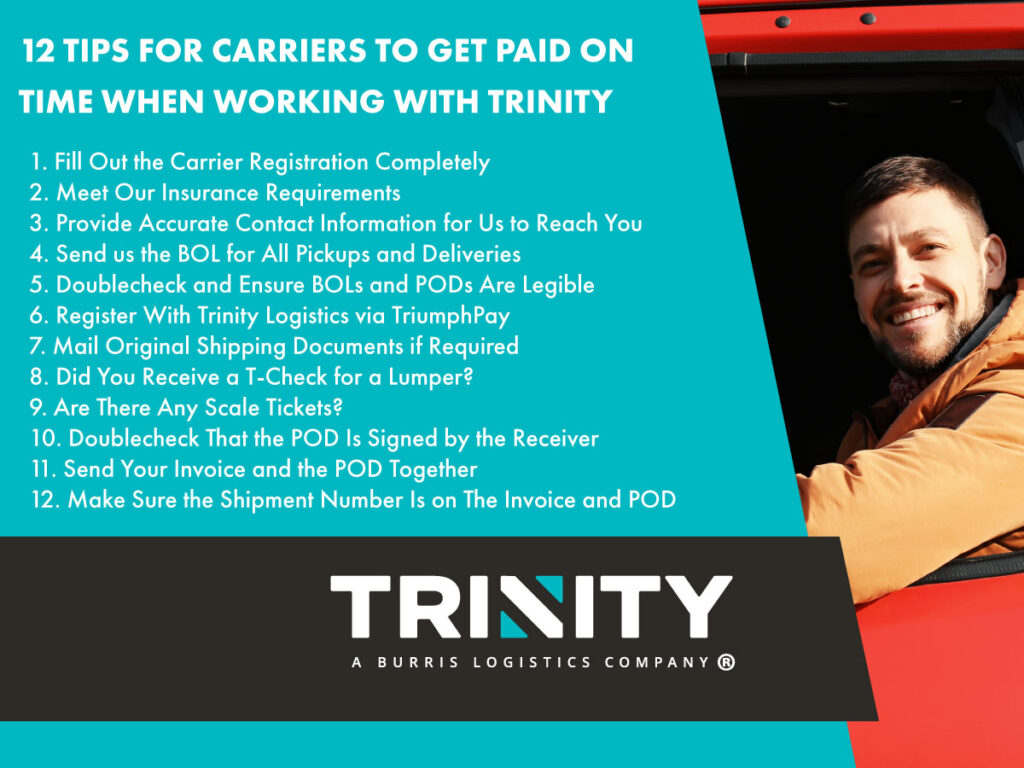
1. Fill Out the Carrier Registration Packet Completely
When you’re starting out as a newly registered carrier in our network, we require you to fill out our online carrier packet. You’ll receive an invitation from My Carrier Packet, allowing you to quickly fill out all the information we need to start hauling with Trinity. Not completely this will not only hold you up from your freight pay, but from you even being able to haul a shipment in the first place.
2. Meet Our Insurance Requirements
Not having the required insurance coverage will also hold up your setup and ability to be paid on time. To become registered within Trinity’s carrier network, motor carriers must meet these requirements:
- Have an active USDOT registered with the Federal Motor Carrier Safety Administration (FMCSA)
- A minimum of $50,000 in motor truck cargo insurance
- A minimum of $1,000,000 in automobile liability insurance
- A minimum of $1,000,000 in general liability insurance
- Worker’s compensation coverage as required by law
- Cannot have an Unsatisfactory or Conditional FMCSA safety rating
3. Provide Accurate Contact Information for Us to Reach You
Make sure the contact information you give us is accurate and up-to-date. Also, be sure to answer when we contact you. If there’s an issue, we’ll want to solve it for you right away, and being able to reach you as soon as possible will speed up the process.
4. Send Us the BOL for All Pickups and Deliveries
Not receiving the proper shipment paperwork or it being sent to the wrong person/Team is something we see very often, holding carrier freight pay up. We can’t process your business and release your freight pay without having your bill-of-lading (BOL) on file for the shipment you’ve hauled. Please send all shipment paperwork [email protected]. You also have the option of uploading your shipment paperwork in the TriumphPay portal if that’s easier for you.
5. Doublecheck and Ensure All BOLs and PODs Are Legible
If we’re not able to clearly read your BOL and proof-of-delivery (POD), we’ll need to reach back out to you. If you’re not able to scan a clear copy, you can mail them to us instead.
6. Register With Trinity Logistics via TriumphPay (and Choose Quick Pay)
Trinity Logistics works with TriumphPay to get carriers paid quickly. As a carrier in our network, you’ll need to register on the TriumphPay website (if you’re not already) and choose your payment terms. We offer two different payment options to suit your needs. You can choose our Quick Pay option to get paid in two business days for a very competitive fee of 1.5 percent. Or you may choose our standard pay option, which is within 24 business days, for no additional cost.
7. Mail Original Shipping Documents if Required
If the rate confirmation states that “originals” are required, please don’t fax or email your documents as your shipping documents must be provided by mail.
8. Did You Receive a T-Check for a Lumper?
We’ll need the receipt of that included with your invoice, otherwise your freight pay might be short.
Wondering what lumper fees are? Click here to learn more about them.
9. Are There Any Scale Tickets?
If scale tickets are stated on your rate confirmation, please send them in when sending in your invoice.
10. Doublecheck That the POD Is Signed by the Receiver
If it’s a stamp, make sure it’s dark enough to be legible for the customer.
11. Send Your Invoice and the POD Together
If they are sent separately, it may appear that pieces are missing, and this can delay your freight pay.
12. Make Sure the Shipment Number Is on the Invoice and POD
Not having this information can hold up the process of filing your shipment documents and releasing your freight pay.
At Trinity, there’s never a question of if you’ll get paid. It’s simply a matter of how quickly you can get us the required documentation so that we can pay you within a reasonable timeframe.
Find Your Next Trinity ShipmentTrinity Logistics is proud to announce Chad Taylor has been named Vice President of Carrier Development.
“Trinity is very excited to welcome Chad Taylor to our team,” said Sarah Ruffcorn, President of Trinity Logistics. “Strengthening and developing our carrier relationships continues to be a key priority for us in the years to come. We look forward to Chad helping us provide the best services for our carrier network and take the Trinity Experience to the next level.”
Taylor has been working in the logistics industry for over a decade, with companies of all sizes.
“I’m really excited to help Trinity increase their brand awareness among the carrier audience,” said Taylor. “There’s a lot that Trinity does behind the scenes, helping many carriers grow their businesses. I’m eager to support the current landscape and expand on that to further strengthen Trinity’s carrier partnerships.”
Taylor brings years of experience in creating and leveraging committed capacity, strategically managing carrier accounts, and building strong carrier relationships by thoroughly understanding their wants and needs in business.
“At Trinity, we know our shipper and carrier partners are integral to our success,” said Mark Peterson, Senior Vice President of Sales. “Chad has the proven experience and a passion for connecting shipper’s supply chains to the optimal carrier network. He’s the perfect choice to lead Trinity’s carrier development strategy.”
Learn more about TrinityAbout Trinity Logistics
Trinity Logistics is a Burris Logistics Company, offering People-Centric Freight Solutions®. Our mission is to deliver creative logistics solutions through a mix of human ingenuity and innovative technology, enriching the lives of those we serve.
For the past 40 years, we’ve been arranging freight for businesses of all sizes in truckload, less-than-truckload (LTL), warehousing, intermodal, drayage, expedited, international, and technology solutions.
We are currently recognized on Transport Topics’ Top 100 Freight Brokerage List, a Top 3PL and Cold Storage Provider by Food Logistics, and a Top Company for Women to Work for in Transportation by Women in Trucking.
It’s no surprise that one of the hottest topics in the world lately is the pain felt at the pump. Rising fuel prices have been at an all-time high, surpassing the costs since 2008, and these prices will only continue to climb. As a result, businesses are being forced to pay more to operate, causing a ripple effect for everyone.
Wait, How Did This Even Start?
You may be wondering how fuel prices even got to this all-time high. Well, they can’t be blamed on any specific event or occurrence as many different factors caused fuel prices to surge.
World Conflict
World conflict is one issue affecting fuel prices, specifically those in Western Europe. The Russia-Ukraine war has been brewing for some time now, and due to attacks, the United States among others has stopped imports, like oil, coming from Russia.
Russia is one of the world’s largest oil exporters, exporting nearly eight million barrels in one month. The drastic change in accepting oil imports from Russia has caused the price of fuel to rise because it’s not as available as it once was.
The Dreaded “C” Word
Another catalyst for the spike in fuel prices is the continual effect of Covid-19. I’m sure you’re tired of hearing it, but the world is still feeling the pains of the virus while we aim to return to life. Recently, Covid forced Chinese ports to close for a brief period and now that the ports are opening back up, supply cannot keep up with demand.
As people try to live alongside Covid-19, office workers are going back to in-person work and people are returning to travel after two years of staying put. With more people leaving their homes, it’s causing a greater demand for fuel while our supply is limited.
The Effects of These Issues
Fuel prices are affecting everyone, including consumers, and businesses, but those in the logistics industry are seeing greater challenges. That’s because the logistics sector has seen disruption after disruption. First, with the issues started by the pandemic, then the port congestion once businesses began to reopen, and so on to now with increased fuel prices. This industry has barely had a moment to catch its breath.
Logistics is at a crossroads; with the United States economy looking at a recession, and world conflicts yet to improve, it’s going to be hard for fuel prices to drop back to normal levels until everything balances out.
How Bad is it Actually?
Even though everyone has been hearing and seeing the high fuel prices, how bad are these prices? Well, in June, the U.S. national average price per gallon topped $5, which is 50 percent higher than it was this time last year. Even pre-pandemic prices were at $2.55 average for that month, showing the direct impact that covid and other issues have caused.
These prices only continue to rise when we talk about the cost of diesel fuel. This type is often more expensive than regular gas, and this is what truck drivers use to fill up their tanks. In June, diesel fuel averaged $5.50 per gallon in the U.S., which is a .50-cent increase from regular fuel. While this increase seems small, when truckers are driving over 500 miles per day, the extra cost can add up quickly.
President Joe Biden has tried to take steps to lower fuel prices in the United States. He has called on Congress to do a Federal Gas Tax Holiday, releasing the charges that the federal government has on fuel. Typically, the government charges an 18-cent tax per gallon on gasoline and a 24-cent tax per gallon on diesel, but President Biden has called for the Tax Holiday to give Americans breathing room as they battle other economic issues like inflation.
High fuel prices are not an issue solely faced by the United States. In fact, gas prices in the United States are on the lower end of the spectrum compared to other countries. For example, while the average in June for the United States was $5 per gallon, in Germany, it averaged $8.26 per liter, while one of the highest fuel prices was in Hong Kong, where gas was $10.71 per liter in June.
How Do High Fuel Prices Impact You?
So, how do the rising fuel prices affect those in the logistics industry? Well, let’s take a look.
Shippers
Increased fuel prices mean higher logistics costs because it’s now more expensive to move their products from point A to point B.
Consumers
Consumers see a direct cost increase on products due to fuel prices. Because it now costs more for shippers to move their products to their destinations, they must also raise the price of their products to continue to make a profit.
Carriers
The biggest issue carriers are seeing with the high fuel prices is the impact on their income. Their operating costs have increased due to the rising fuel and product prices. And with rates lower than they’ve been throughout the pandemic, many carriers have decided to put a pause on driving until the market return to normal. This could cause added chaos to the market. Should more carriers halt their work, there could be an imbalance in the industry, causing more backlogs and shipping delays as a result.
Trinity is Here to Help
As an experienced third-party logistics company with over 40 years in business, we’ve worked with many shippers and motor carriers through the ups and downs faced in this industry, including this one. We’ve seen it all and are here to help you through these troubling times.
Whether you’re a shipper looking for better logistics management or a motor carrier looking for dedicated freight to keep you consistently moving, you can find all the solutions you need with our People-Centric approach.
Get connected with us today so you can start having Trinity Logistics, a Burris Logistics Company, by your side, no matter the state of the market.
Learn more about Trinity Logistics Join our mailing listMany people think that human trafficking only happens in movies, or in small, impoverished countries. The truth is, it’s a real, modern-day version of slavery, exploiting an estimated 40 million victims worldwide, and occurring in all 50 states across America, according to the National Human Trafficking Resource Center. Truckers Against Trafficking is one group raising awareness to help reduce those numbers.
Trafficking involves the use of force, fraud, or coercion to control victims for the purpose of engaging in commercial sex acts or labor services against his or her will. Trafficking affects people around the world and doesn’t discriminate by age, gender, ethnicity, or socioeconomic background.
Human trafficking is commonly seen in areas within the sex industry, such as brothels, escort services, illicit massage businesses, strip clubs, and street prostitution. There are now many different communities recognizing that they can help reduce sex trafficking by working alongside service providers, criminal prosecutors, and law enforcement.
We’re proud to have partnered with the efforts of Truckers Against Trafficking, to ensure that the more than 70,000 carriers Trinity Logistics works with are trained on how to spot trafficking and how to report it.
What is Truckers Against Trafficking?
Truckers Against Trafficking (TAT) is an organization dedicated to educating, equipping, empowering, and mobilizing members of the trucking, bus, and energy industries to recognize potential trafficking situations and report them to the authorities. TAT’s tagline is “make the call, save lives.” TAT is working to raise up a mobile army of transportation professionals – the eyes and ears of our nation’s highways – to be a critical resource for law enforcement in fighting this crime, as they are invaluable when it comes to recognizing traffickers who are exploiting the transportation system for their personal gain.
Truckers Against Trafficking’s co-founder, Lyn Leeburg, developed the idea for TAT by accessing memories of her childhood. Her parents owned a motel in El Paso, Texas, where good-natured and hard-working truckers were frequent customers. Once Leeburg realized that the FBI were finding women and children forced into prostitution at places truckers frequent, like motels and truck stops, she realized that it would be important to work with the trucking industry to raise up a transient army, capable of recognizing and reporting human trafficking across the nation.
In March 2009, Leeburg, her four daughters, and one other woman started Truckers Against Trafficking as an initiative of Chapter 61 Ministries, an earlier organization they had founded. Two years later, Leeburg’s daughter, Kendis Paris, took over the leadership of TAT and turned it into a 501(c)3 nonprofit organization. From there, Paris built out TAT’s programs, expanded its vision and strategy and developed it into the award-winning organization it is today.
Trinity Logistics’ Partnership with TAT
As a third-party logistics (3PL) company, Trinity Logistics does not directly employ drivers, but we do work with a network of more than 70,000 freight carriers. According to TAT, this partnership could be a game-changer.
Kendis Paris, TAT’s Executive Director, believes our partnership with TAT could have an “exponential effect” on the awareness of human trafficking and the reporting of potential cases.
Trinity plans to encourage all of our carrier base to view the TAT training video and to distribute the TAT materials through our website, email campaigns, and through conversations with our Carrier Relations and Carrier Development departments.
What are TAT’s training initiatives?
TAT has made its training easily accessible. Carriers can obtain the training video and free supplemental materials directly from TAT for inclusion in new driver orientation and/or regular safety meetings. The TAT training course is also available on several major Learning Management System providers that serve the transportation industry, as well as being publicly available directly through TAT’s learning portal, which is a great option for independent owner-operators.
Becoming TAT trained is as simple as watching a training video that equips drivers with the knowledge to recognize and respond to potential trafficking situations. Once trained, drivers will receive a window decal and a wallet card with the National Trafficking Hotline Number and questions to ask if they feel someone may be a victim of human trafficking.
Companies can train their drivers and employees with TAT materials, adopt the internal reporting system so that TAT can identify and honor the Truckers Against Trafficking that drive for a company, partner with TAT to assist law enforcement, share TAT’s newsletter, use influence in the trucking industry to tell others about TAT, become a corporate sponsor, and consider donating a haul of the Freedom Drivers Project to one of TAT’s many events around the country.
Companies can join TAT in the fight against human trafficking – and meet their sustainability goals at the same time – through a variety of ways: train their drivers/employees with TAT materials and then register the number of company employees trained via their TAT-Trained website page; create a company culture that identifies and honors the truckers against trafficking that drive for your company; partner with TAT to assist law enforcement; share the TAT newsletter with employees; tell others in the trucking industry about TAT and why it’s important to train; become a corporate sponsor, and consider donating a haul of the Freedom Drivers Project (TAT’s unique mobile museum) to one of many TAT events across the country.
Even concerned members of the public can join TAT’s efforts, through referrals, fundraisers, or by hosting a screening of TAT’s training video.
Success of Training Initiatives
When the National Human Trafficking Hotline (NHTH) began in late December 2007, there were zero calls from truckers. In 2008, there were only three truckers who called in to report a potential situation. With the beginning of TAT in 2009, those numbers began to grow, with the vast majority of calls coming in recent years. Today, more than 2,782 calls have been made to the NHTH by people identifying as truckers, which have generated more than 715 likely cases of human trafficking, involving over 303 victims. And those numbers are only a small slice of the data. TAT knows from surveys and anecdotal evidence that many more cases have been reported to 911 or local sheriffs’ offices around the country. TAT still encourages reporting to the NHTH because they are the only organization in the country geo-tracking this data. There are currently 1,206,596 people registered as TAT trained.
Part of the main focus of the training initiatives is to educate truckers away from thinking “she’s a prostitute” and towards thinking “she’s a potential victim”. In the training video, a woman named Shari shares the story of how she was forced and coerced into sexual slavery along with her cousin. TAT chose to have Shari share her story to help everyone understand how so many victims end up on the lot.
TAT says the number one response TAT gets from drivers who are first finding out about the program is “I have daughters, I have granddaughters. How can I be a trucker against trafficking?”
T-A-T is as easy as 1-2-3
TAT’s core message is a simple one. If you see a minor selling commercial sex, or if you suspect any kind of pimp control, call the national hotline at 1-888-373-7888 and report what you know. The training materials are out there, free of charge. Putting a stop to human trafficking is just a matter of implementation.
“If you are willing to work hard, partner well, and persevere through the challenges, you would be pretty amazed at how many people will come together around this cause. This is dark work and at times it seems like the bad guys are always winning, but then I remember drivers, company executives, and law enforcement people who we’ve worked with over the years and I remember that the good guys outnumber the bad, that progress is being made, that awareness is on the rise, and that this incredible, hard-working, salt-of-the-earth, moving army is truly being mobilized,” said Paris, concluded.
LEARN HOW YOU CAN HELP TATOriginally written 10/26/2016. Updated by Laura Cyrus of TAT on 7/23/2021
The Distinguished Providers of the Year Award Program offers Trinity the chance to recognize top providers within all of their transportation modes, something that had not been done previously. Award winners are carriers within the Trinity network that continued to support our customers and provide exceptional service, even throughout a global pandemic. They are well known amongst the company as providers that Trinity could not have been successful without. Trinity Logistics thanks these carriers who have been an integral part of the day-to-day operations for their continued commitment and service to Trinity Logistics.
The categories and winners are:
| CATEGORY | WINNER | CATEGORY | WINNER |
| SMALL TL (<100 TRUCKS) | Vital Transportation Corp | REGIONAL LTL | Southeastern Freight Lines Inc |
| LARGE TL (>100 TRUCKS) | Giltner Transportation Inc | NATIONAL LTL | Fedex Freight Inc |
| STRATEGIC TL | Harbor Seafood | INTERMODAL | CSX Intermodal |
| REFRIGERATED LTL | Howell’s Motor Freight Inc. | INTERNATIONAL | Saturn Freight Systems, Inc. |
| REFRIGERATED TL | Independent Cold Enterprise LLC | DRAY | Commercial Transportation LLC South Kearny |
| FLATBED | Lionhart Transportation LLC | EXPEDITED | Millhouse Logistics Inc |
| HEAVY HAUL | Morrell Oversize Incorporated | INTERNATIONAL TL | Central De Fletes Y Consolidados Sa De CV |
Additional to the top providers recognized by mode, there was a separate category created, “The Trinity Titan Award”. This award was set to recognize very small operators within Trinity’s network who have regularly dedicated their capacity and demonstrated uncommon value, or “grit” as we like to call it, to Trinity during the specified year. This award is determined by a person of exceptional importance and reputation that stands out for greatness of achievement that reflects Trinity’s values.
Those winners are:
| L&J Farm LLC | Jeffery Noel & Gregory Noel | Andrew Oliver |
“We are honored to recognize these Service Providers which were selected among Trinity’s deep book of relationship partners demonstrating consistent value to our Shipper Customers during a historically difficult year. When interviewed for feedback from the more than 70 nominations by our Operations teams across the country, each one of these Service Providers stood out within their core service offering among their peers,” said Bradley Palmer, Director of Carrier Development and Pricing at Trinity Logistics. “Distinctly, this is the first year Trinity Logistics has presented its “Trinity Titan” awards. After listening to stories from our teams about these small fleets, our Leadership was compelled to honor these partners that demonstrated grit throughout a challenging year.”
Each Distinguished Provider will be presented with a crystal award to commemorate their success and achievement with Trinity Logistics.
“Trinity Logistics wants to thank our 2020 Distinguished Providers of the Year for being key to our continued success. We greatly value the essential delivery they provide our most important customers alongside our Operations Teams. We are truly honored to work with these Providers day in and day out,” said Sarah Ruffcorn, President of Trinity.
Trinity appreciates our contracted carriers with several other unique benefits and awards. As a select carrier Trinity offers a 1.5% QuickPay rate through TriumphPay.
To find out more about our great customer service and benefits to carriers,
CLICK HEREAuthor: Christine Morris
The economic and operational effects of COVID-19 on the trucking industry have been challenging and devastating. Many have warned the true storm for the trucking sector has yet to arrive, and the effects witnessed to date have been warning signs of what’s yet to come.
Not all operations have been equally affected, but tough times are on the horizon for some trucking companies. The early impacts of the pandemic were at ports, as containers shipped in from China were affected there first.
As lockdowns happened and with events canceled, companies that specialize in moving concert and trade show exhibit items were affected the most. Some fleets dedicated to hauling equipment for events have noted that economic hardship. Others in similar sectors have reported equal occurrences.
THE HARDEST-HIT SECTORS
The food industry has been especially hit hard. Many restaurants and bars have had to close, except for takeout outlets that have stayed afloat. This has left food-service trucks with dwindling sources of income. The International Foodservice Distributors Association predicts the industry will lose $24 billion during the last three months of 2020as the pandemic closes eateries, hotels, and schools.
Another group affected are those who service the automotive industry. Many manufacturers have enacted temporary shutdowns, which affects fleets in more than just their shipments. This limits their supply of new parts for trucks when they need repairs.
Those servicing some of the retail sectors may also struggle. Malls and retail stores are closing at an astounding rate worldwide, slashing demand for the transportation of various goods. While online shopping and delivery could offset the losses faced by trucking companies to a degree, it will take a while for the playing field to level.
THE SECTORS BENEFITING FROM THE PANDEMIC
Of course, fleets who haul sanitizer, toilet paper, groceries, and home office supplies are staying exceptionally busy. Some fleets are even adding more freight to their rosters to keep their trucks running, while others are expanding their operations to keep up with demand.
DAT Solutions has noted that urgent retail orders continue to drive up spot rates for reefer and van equipment. The company says nervous shoppers buy as much as they can for every trip, and retailers are relying more on spot market providers to restock shelves rapidly when other truckers face delays.
Now that a significant part of the world’s population is home, families are also cooking more often. This means that freight demand for grocery and food-related truckers will continue to soar, creating a new market trend many can capitalize on if they’re quick on the uptake.
As retail takes a downward turn, an increasing number of people are shopping online and relying on curbside pickups. Amazon has reportedly been so busy that it’s hired another 100,000 staff members to keep up, while Walmart has enlisted the help of another 150,000 employees.
PREPARING FOR THE UPCOMING RECESSION
While many experts are hailing these changes as a ‘new normal’, it’s important to remember that a recession is looming. If countries put in place secondary lockdowns as the second wave of COVID-19 hits, freight won’t be flowing at the same time. The trucking industry will eventually recover if this proves to be the case, but the time frame for this recovery will depend on how long the virus takes to peak, and how long the recession will last.
WHAT TRUCKING COMPANIES CAN DO
What can fleets do to counteract the potential effects of a second wave? That will depend on the sectors they operate in. Trucking industry professionals have warned some companies may struggle to keep their drivers busy while others will be rushed off their feet in the face of an upswing in demand.
Those in the grocery and refrigerated goods sectors aren’t likely to feel the pinch, even once the recession has arrived. Those in the general freight space may have fewer tons, fewer route miles, and fewer loads to haul. It’s realistic to expect that some carriers will not survive.
In the meantime, trucking companies should work to keep their drivers busy in any way they can. They should remain financially prudent and cut costs where necessary without compromising on safety or service quality. On the other end of the pandemic, there will be many companies that will need to restock their supply chains and they’ll need partners to help them achieve this.
If you’re a trucking company owner or associated professional, get out there, network, talk to your customers and determine what their needs will be once the outbreak has died down. Even if business is not booming right now, you need to find a way to keep drivers in the short term so that your company does not emerge with under-used equipment and a lack of drivers.
Keep your business alive and kicking and be prepared for a decline in business and revenues. We are sitting on the precipice of some major changes in both the world’s economy and the trucking sector. It will be possible to survive, but only with the right approach and strategic partnerships.
FIND A GREAT PARTNER IN TRINITYGuest Author: Lori Dodson
Tanker endorsement is one of those regulations that often get some buzz in the trucking industry for CDL holders. What is it? Why is it needed? When did this become enforced? The information that has been published about this online is fairly vague, so we’d like to set some facts straight to help you ensure that you’re hauling your liquid or gaseous freight legally.
Do I Need a Tanker Endorsement?
The Federal Motor Carrier Safety Administration (FMCSA) has rolled out a regulation meant to keep the roads safe from commercial drivers carrying large amounts of liquid or gaseous freight without the proper training. In order to do this, the FMCSA changed the definition of a “tanker,” which, in turn, has changed the requirements for which drivers are required to hold a “tanker endorsement” on their CDL. This change means that even those who are driving dry vans, reefers, flatbeds, and box trucks will be required to hold the endorsement if they meet the requirements below. If the following conditions occur, you are responsible for obtaining a tanker endorsement on your CDL:
- Your cargo includes liquid or gaseous individual containers larger than 119 gallon capacity.
- The containers are loaded, and not empty.
- The total combined volume in those containers exceeds 1,000 gallons.
Where is it Enforced?
All states began enforcing this regulation in July 2015.
When Did it Become Law?
The tanker endorsement regulation was originally debuted by the FMCSA in 2011 and it was said then that all states must be in line and enforcing by July 2014. Since that date passed and not all states were on board, this caused quite the confusion for national carriers. The FMSCA finally pushed a hard deadline of July 2015 for enforcing the law.
What are the Consequences of Not Abiding by the Law?
If commercial drivers are found to be driving without the proper tanker endorsement (if their load meets the regulation requirements) they can be charged a civil penalty of up to $5,000 per instance, as well as possible license suspension for up to 90 days, according to the FMCSA Section 383.53.
In other words, this regulation should not be taken lightly. If you don’t follow the law, your job could be on the line.
Why Haven’t I Heard About it?
This law may come as a surprise to many, as there wasn’t much media coverage when it was first unveiled in May of 2011. The reason why there wasn’t much talk was likely because there was a three year delay from its creation to the original enforcement date of July 2014. Then years went by with some states taking the regulation into consideration, and others ignoring it, since they were not legally required to enforce it.
How Do I Get the Endorsement?
To get the endorsement, simply go to your state’s Department of Motor Vehicles (DMV), request the Tanker Endorsement Knowledge Test and pay the fees, which average around twenty dollars. There are a few practice tests available online, like this one.
The smart move is to go ahead and get the tanker endorsement on your license as soon as possible if you plan on carrying any significant volume of liquid and gaseous material, hazardous or not. The process of getting the endorsement is extremely minimal compared to the consequences of being caught without it.
Looking to work with a transportation provider that stays up-to-date on carrier regulations?
Note: The information provided in this article is up-to-date at the time of publishing. Trinity Logistics cannot be held responsible if any driver is caught without a tanker endorsement while traveling through a state which was listed as not enforcing the rule at time of publishing.
Originally written December 4, 2014. Updated by Christine Griffith